

GU Expected to Face Drop In Funds, Graduate Student Enrollment From Abroad
Ajani Stella Senior News Editor
Georgetown University is forecasted to lose $35 million in federal research grants and see a 20% decline in international graduate student enrollment amid federal cuts to higher education funding and changing immigration policy.
Interim University President Robert M. Groves announced the updates in an Oct. 28 email to faculty and staff, in which he affirmed April financial measures that cut $100 million from the university’s Fiscal Year 2026 budget and instituted a hiring freeze. Groves also said the university is unsure how long the decline in international student enrollment will last and how it will affect university finances.
Groves said the university will continue to assess its financial future as it prepares to reevaluate the hiring freeze and budget cuts in December.
“It is now certain that the $100M cut in April was prudent,” Groves wrote in the email. “However, many uncertainties remain. Thus, it’s too early to know the outcome of the December
review — whether we could relieve some of the constraints on spending or whether more cuts will be needed.”
Groves said the projected financial loss is higher than the university’s previous estimates, which he did not specify.
Gregory Afinogenov, the Georgetown chapter president of the faculty union American Association of University Professors, said the budget cuts have already hit faculty.
“There have already been significant sacrifices,” Afinogenov told The Hoya. “This $100 million cut has not come for free. Dozens of classes have already been canceled, cut, especially those taught by adjunct faculty — obviously people have lost money.”
Georgetown has faced increasing pressure from the federal government as President Donald Trump ramps up attacks on higher education institutions, including cutting research funding and restricting international students’ visas.
See BUDGET, A7
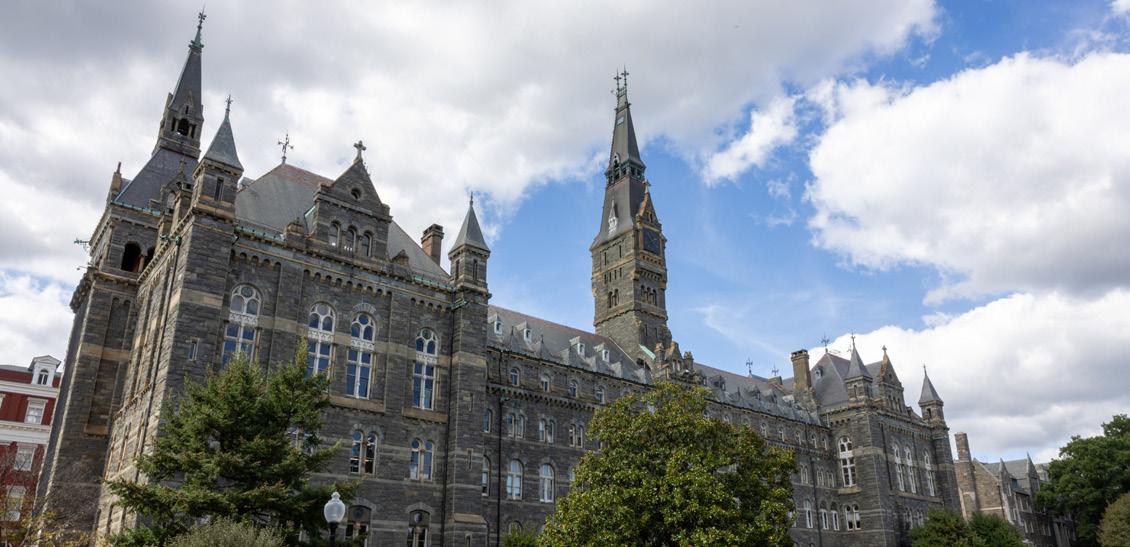
Georgetown University is projected to lose $35 million in grants and see a 20% decline in international graduate student enrollment.
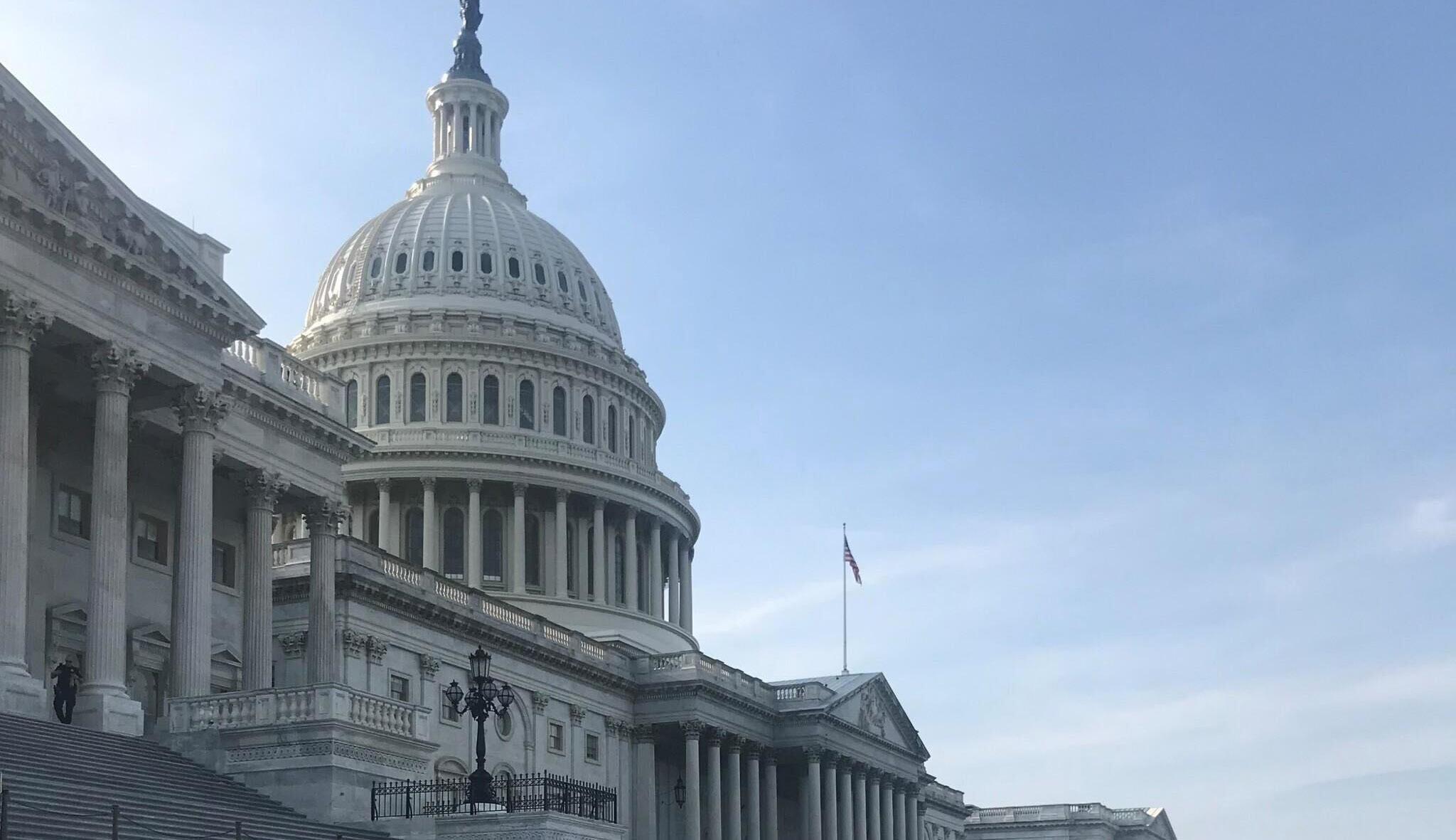
state of
Shutdown Leaves GU Students in Limbo
Ruth Abramovitz Senior News Editor
Georgetown University students pursuing federal internships feel torn between disappointment at losing professional experience and relief at gaining free time as internships are paused during the ongoing federal shutdown.
After Congress failed to pass a funding resolution, the federal government shut down Oct. 1, leaving 670,000 workers across the country furloughed and 730,000 working without pay.
While some staff and Georgetown student interns in the Senate
Record GU Student Turnout Gives Wagner/Missaghi Win
Sofia Thomas GUSA Desk Editor
Georgetown University students elected the 2026 Georgetown University Student Association (GUSA) executive amid concerns over federal intervention in higher education.
The GUSA Election Commission
announced Oct. 24 that students elected Darius Wagner (CAS ʼ27) and Nazgol Missaghi (CAS ʼ28) as president and vice president. In addition to advocating against crackdowns on student gatherings, Wagner and Missaghi’s campaign centered on encouraging the university to reject federal attacks on higher education, which some Wagner/Missaghi voters said is an important responsibility for a student government in Washington, D.C. Wagner said his GUSA administration will aim to defend academic freedom, which students strongly value.
“The student body overwhelmingly supports their freedoms, academic freedoms, their freedoms to exist as college students, their freedoms to talk about whatever they wish to on their college campus without the federal government controlling what, how and where they can learn,” Wagner told The Hoya
Ignacio Loaiza Sandoval (CAS ’28) said he voted Wagner/Missaghi because of their commitment to activism and pushing back against federal intervention.
“College students have always been politically active,” Loaiza
Sandoval told The Hoya . “And I think that’s a good thing. I think we all came here to be close to the center of action here in D.C., and I think that as the student association, they have a very unique role to advocate for us and our needs, but also our values.”
President Donald Trump has ramped up attacks on higher education institutions, including cutting research funding and restricting international students’ visas.
On Sept. 28, Interim University
President Robert M. Groves said in an email to faculty and staff that the university is forecasted to lose $35 million and see a 20% decline in international graduate student enrollment as a result of federal actions.
Missaghi said she and Wagner will urge the university to push back against federal actions that threaten students, including restrictions on diversity, equity and inclusion (DEI) initiatives.
“We will advocate for the university to take clear, public stances against federal overreach into higher education, particularly around issues like DEI restrictions, threats to international and immigrant students and attacks on reproductive and LGBTQ+ rights,”
Missaghi wrote to The Hoya Wagner and Missaghi advocated for reducing amplified noise policies and reinstating informal warnings from residential assistants (RAs) to
allow student gatherings. Wagner and Missaghi’s campaign also championed ending legacy admissions and increasing funding for financial aid.
Loaiza Sandoval said he believes Wagner and Missaghi will be able to follow through on their platform by working directly with the university administration.
“I think they outlined many actionable things that they can actually get done through their already-built connections with admin,” Loaiza Sandoval said.
Some students worry that Wagner and Missaghi’s plan to oppose the federal government could ultimately negatively affect Georgetown.
Patrick van Eyck (SFS ʼ28), who voted against the Wagner/ Missaghi ticket, said GUSA should avoid actions that could draw negative attention from the Trump administration.
“I think that when we would be attacking the Trump admin to the detriment of Georgetown, that’s not necessarily a good thing for GUSA to be doing,” Van Eyck told The Hoya. “We should be supporting these groups that are out here protesting the Trump admin heavily and as much as we can, but I would worry about Georgetown coming under direct attack from the Trump admin.”
This year’s election recorded 37% voter turnout, with 2,940 students casting valid
See GUSA, A7
have been working without pay, House of Representatives staffers have not been working on Capitol Hill, as the chamber has not been in session in October.
Timothy Cole-French (SFS ’26), an intern on Capitol Hill for a member of the Massachusetts delegation, said he sought out his internship to gain experience needed to pursue his career path after graduation.
“I want to work as a ‘leg’ aide in either a law firm or a lobbying group, and for those roles you like, explicitly need some form of Hill experience,” Cole-French told The Hoya. “So I realized, if I want to get that sort of job, I have to work on the Hill.”
Cole-French, who is now furloughed, said he was stunned to see his internship stall.
“Above all, it was surreal, just because shutdowns are big national news,” Cole-French said. “I would hear about it back in Boston when I was in high school, but then to just be in the midst of it was crazy.”
The federal government has been closed for 30 days as of Oct. 31, and if it stays closed through Nov. 5, the shutdown will break the record for the longest government closure, which was 34 days. The Senate has failed 13 votes to pass a continuing resolution funding
the government, with Democrats holding out over the exclusion of an extension of health care tax credits.
Anita Tun (MSB, SFS ’27) interned for three weeks in the office of Rep. Lou Correa (D-Calif.) before being forced to stay home. In addition to missing out on mentorship from staffers and the capstone project of her internship, during which she would have researched bills for the representative to cosponsor, Tun said she also lost the educational value of a Congressional internship. “One of my favorite parts about See SHUTDOWN, A7
Local, State Elections Spark GU Student Mobilization, Voting
Nicolas Abreu Events Desk Editor
As Georgetown University students continue to vote in a series of off-year elections across the United States, many have underscored the impact of local politics while welcoming national engagement with local and state elections.
With election day slated for Nov. 4, Georgetown students are voting early, via absentee ballot or in person, for consequential statewide elections in New York, New Jersey, Virginia and California, as well as a slate of local elections across the country. Members of the student body have organized phone-banking and canvassing events surrounding hot-button ballot issues, including the New York City mayoral election and the California Proposition 50 ballot measure.
Shay Pratt (CAS ’26), a student from Fairfax, Va., said she feels the national media has paid more attention to electoral politics than the candidates themselves.
“I feel like I haven’t seen, ‘This is a vote that matters to me because it’s my state senator,’” Pratt told The Hoya. “It’s more like, ‘This is an election that matters because it’s reflective of larger themes in the U.S. political landscape.’”
Katie Rankin (CAS ’28), another Virginia resident and board member of Georgetown University College Republicans (GUCR), said she feels the
tional economy and increasing
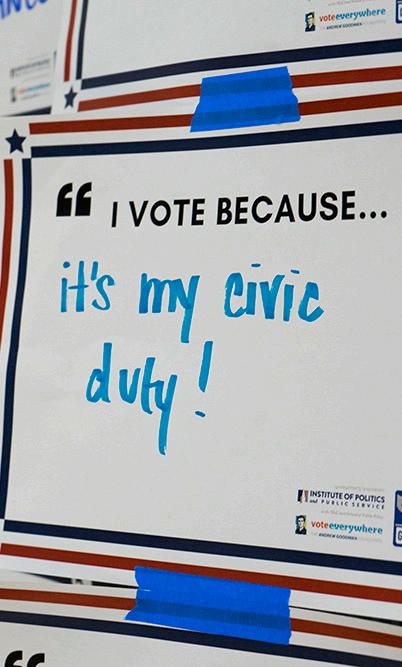
The ongoing shutdown of the federal government has left many Georgetown University students in a
limbo as they lose professional development opportunities and sources of income. Yet, they welcome free time as internships remain paused.
Georgetown University students from across the country have voted or are preparing to vote in off-year state and local elections.
Despite the loss of star Kelsey Ransom, the Georgetown University women’s basketball team looks to continue reaching greater heights.
In her review Emma Stone’s latest picture, Isabelle Cialone (CAS ’27) praises Lanthimos’ perspicacity and actors’ prowess.
With a strong transfer class, the Georgetown University men’s basketball team is prepared for its most competitive season in years.
Urge Peñalver to Listen to Students
Arriving amid attacks on higher education and restrictions on international student enrollment and federal funding, Georgetown University’s new president, Eduardo Peñalver, will begin his position at a unique time in our school’s history.
Announced Oct. 15, Peñalver will become the 49th university president on July 1, 2026. Given these concerns in higher education, we wish him luck as he navigates these trying times.
Peñalver inherits the tall task of following in the footsteps of President Emeritus John J. DeGioia (CAS ’79, GRD ’95), who previously served as the university’s longest-tenured president.
Under DeGioia’s leadership, the university pursued many progressive reforms, including meaningful strides toward diversity and inclusion. In 2015, DeGioia asked the Working Group on Slavery, Memory and Reconciliation, a group created to research the university’s historical connections to slavery, for recommendations on reconciling Georgetown’s history with slavery and the slave trade.
The Editorial Board urges the next president to honor DeGioia’s legacy by continuing his work for progressive causes through promoting affordability and equitable access in admissions, combating racism and pursuing visibility on campus. We also implore Peñalver to take a step forward in leadership by listening to and integrating student voices in the university’s affairs.
Peñalver must, unlike some previous administrations, adequately address the student body’s voice — whether it emerges from student organizations, Georgetown University Student Association (GUSA) or referendums.
This academic year, students have voiced both support for and opposition to a number of university priorities and initiatives, including a referendum calling for divestment from companies with connections to Israel and protests against the planned subcontracting of Georgetown University Transportation Shuttle (GUTS) workers. The Editorial Board has made clear what we want to see from the administration regarding these issues: any policies enacted should both adhere to the university’s Jesuit values of people for others and reflect genuine engagement with student input.
After weeks of student activism, a university advisory committee voted Oct. 23 to advise university administration against implementing a plan to remove GUTS drivers from direct university benefits. Peñalver now has the opportunity to demonstrate that Georgetown’s leadership values student voices. We ask that Peñalver avoid dismissing students’ concerns and rather pay close attention to our demands.
Though student referendums are important, they are nonbinding and there is no formal obligation to implement the demands. This was evident when students voted in favor of a referendum calling for divestment from companies associated with Israel, and Interim President Robert M. Groves immediately declined to implement the requests.
Just last week, students passed two new referendums: the Securing the Arts in Georgetown’s Expansion (STAGE) Act, which encourages Georgetown to publicly acknowledge its academic and financial commitment to the arts, and the Restore Student Life Act, which calls for reform in the conduct process for noise violations and later weekend quiet hours. Whether the administration chooses to heed these results will be a test of its commitment to honoring students’ voices.
Darius Wagner (CAS ’27), president-elect of GUSA, said he is optimistic about the opportunity to work with the incoming administration.
“We are eager to hear that the president is wanting to engage with the student body and we are prepared to facilitate this,” Wagner and Missaghi wrote to The Hoya Before coming to Georgetown, Peñalver was the president of Seattle University, where he faced criticism from the student body and faculty for dismissing their concerns at a town hall about the univer-
sity’s future. We hope his leadership at Georgetown does not foment the same response.
Steven Hong, a sophomore at Seattle University, reflected on Peñalver’s tenure as the university’s president, saying Peñalver sometimes felt distant from students.
“I think he did a good job at addressing concerns,” Hong wrote to The Hoya. “There were no major issues that came up that I thought he wasn’t addressing. Although he didn’t really seem to be trying to communicate with students one on one and relying on his staff to do so.”
Beyond honoring student referendums, the Editorial Board wishes to see transparency from Peñalver, especially regarding admissions and changes to campus.
Under DeGioia’s leadership, Georgetown allegedly maintained a list of around 80 applicants each year whose names were marked with “Please Admit.” This created distrust and uncertainty among the student body toward the admissions process.
Students deserve a clearer picture of how the admissions process works and confidence that it is both fair and honest.
As for the campus itself, the potential redevelopment of Village A risks the sanctity of our beloved rooftop spaces. Moving forward, any renovation of Village A must include student voice and preserve rooftop access. The university should include students on both theFeasibility and the Design Committees going forwards.
Under Peñalver’s leadership, Georgetown should also be more inclusive concerning reproductive health.
In 2013, Peñalver wrote an article defending the Affordable Care Act and its guarantee of contraceptive coverage, arguing that religious objections from employers did not justify denying coverage.
If this is what Peñalver believes, the new administration should grant full official recognition and funding support to H*yas for Choice so that it can operate alongside other student-led groups, instead of forcing the group to the margins.
Furthermore, the university should review its health services policy so that contraceptive care, including hormonal birth control and emergency contraception, is made accessible on campus for those who need it.
Currently, the Student Health Center cannot prescribe birth control or hormonal medicine solely for the purpose of contraception. This should be a tenet of basic student care, protecting the health and safety of every member of our Georgetown community.
The final thing the Editorial Board asks of our new president is that he fight to protect our international student population from harsh Trump-era policies.
In light of the Trump administration revoking or terminating the statuses of many international community members, we hope Peñalver will proactively safeguard these students’ ability to study, work and participate fully in campus life so that Georgetown remains a safe home for all members of its community.
Anna Gale (SFS ’28), GUSA’s director of external affairs, said opposition to Trump is necessary.
“Under the Trump administration, we’ve seen policies that directly affect the lives of our students,” Gale told The Hoya. “As our president, it is Peñalver’s responsibility to protect the students on campus whom the Trump administration is hurting.”
Peñalver has a strong track record of offering opportunities for student engagement, which his community forums and strategic planning initiatives at Seattle University clearly demonstrate. He has also publicly defended diversity and inclusion in higher education, framing them as core Jesuit values.
Georgetown students deserve a president who will honor the principles of accountability and transparency, which are essential to ensuring that student voices truly shape our community.
The Hoya’s Editorial Board is composed of six students the beliefs of a majority of the board and are not representative of The Hoya or any individual member of the board.
Oct. 16, 2001
What a weekend.
The events surrounding the inauguration of John J. DeGioia as our 48th president were something in which all members of our university community could take pride. Saturday’s speeches, concert and reception reflected what we consider to be at the heart of Georgetown’s unique identity. Surprisingly, the ceremony itself was not full of pomp and circumstance. While the faculty did indeed enter in full academic dress to the notes of the Georgetown band, the air of the occasion was unpretentious. Rather, most of the speeches that were made were either intellectually challenging, inspira-tional, or both. The reflection of Steven C. Foster of Facilities and Housing was especially poignant. Immediately following the inauguration was a long overdue event in which all parts of Georgetown had the opportunity to interact in a social setting. Students, faculty, staff, administrators and alumni had the chance to mingle and share their Georgetown experience. The event, despite its location miles from campus, left those in attendance with a feeling of what Georgetown really meant. The day was capped by an Evening with Dave Brubeck, a performance masterfully weaving routines by Brubeck’s band and pieces by student performers. Brubeck was chosen for both his talent and his commitment to social justice, and was completely appropriate for the event. It would take pages to recognize of all those who deserve thanks for the production of such a fine weekend. But we would be remiss if we failed to mention the efforts of John Glavin and Jose Bowen. Their work, and that of countless others, helped bring together an event that will not soon be forgotten. Especially impressive were the performance of several student groups, who, against all odds, successfully performed in the limelight.
The Chimes, concert choir, band, jazz band, jazz choir and orchestra all came together to show that Georgetown has a vibrant performing arts community that is alive and well.
The events of this weekend brought together so many facets of the university in a meaningful way that the university should make every effort to do this on an annual basis. While we are all quick to hail Georgetown Day, Homecoming and even the Block Party as community-building events, this was perhaps the best to date. Events like it should continue. While costing plenty of money, the long-term fundraising gains to be had most certainly outweigh the short-term costs.
This weekend was special. Students, faculty, staff, alumni and administrators came together to celebrate the inauguration of our 48th president and Georgetown University. An encore next year would be great. But let’s keep DeGioia.
The Editorial Board
Georgetown students deserve a president who will honor the principles of accountability and transparency, which are essential to ensuring that student voices truly shape our community.
The Editorial Board “Urge Peñalver to Listen to Students” thehoya.com

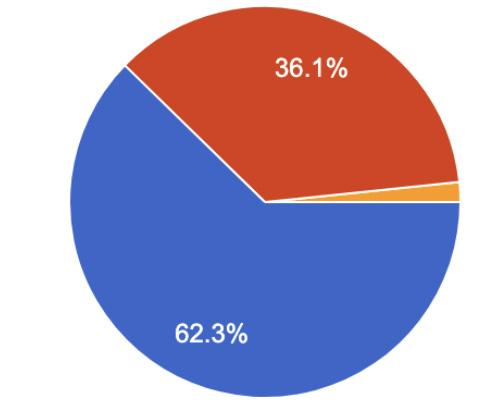
On Oct. 15, Georgetown University announced that Eduardo Peñalver would serve as the university’s next president, succeeding President Emeritus John J. DeGioia (CAS ’79, GRD ’95). This week, the Editorial Board urged Peñalver to follow in DeGioia’s footsteps by advocating for progressive causes and go further by listening to and
integrating student voices in university affairs. In order to gauge student opinion, students were asked if Peñalver should focus on combating the federal government’s threats to higher education during his term. Of the 122 respondents, 62.3% said yes, 36.1% said no, and 1.6% said they were unsure.
EDITORIAL CARTOON by Ray Tian

Founded January 14, 1920
Maren Fagan, Editor in Chief
Patrick Clapsaddle and Nora Toscano, Executive Editors
Madeline Grabow, Managing Editor
Ruth Abramovitz, News Editor
Ajani Stella, News Editor
Sophia Lu, Features Editor
Saroja Ramchandren, Features Editor
Thejas Kumar, Opinion Editor
Ella O’Connor, Opinion Editor
Tanvi Gorripati, Guide Editor
Grace Ko, Guide Editor
Nate Seidenstein, Sports Editor
Madeline Wang, Sports Editor
Angela Lekan, Science Editor
Ruth Noll, Science Editor
Rohini Kudva, Design Editor
Madeleine Ott, Design Editor
Aria Zhu, Design Editor
Caroline Brown, Copy Chief
Evan Ecklund, Copy Chief
Jackson Roberts, Copy Chief
Fallon Wolfley, Blog Editor
Amanda Bloom, Multimedia Editor
Kate Hwang, Multimedia Editor
Meghan Hall, Photo Editor
Haan Jun (Ryan) Lee, Photo Editor
Board of Directors
Jack Willis, Chair
Catherine Alaimo, Amber Cherry, Lauren Doherty, Lindsay Eiseman, Caleigh Keating, Georgia Russello
Peter Sloniewsky, General Manager
Sophia Williams, Technology Director
HOYA HISTORY
ALIDEDEOGLU
Reexamine Word Choices
The more time I spend in and around Washington, D.C., the more I see and hear the same words over and over again: democracy, freedom, liberty. They hang from banners, echo through conference halls and punctuate politicians’ speeches. Georgetown University hosts programs (e.g., Georgetown Democracy Initiative, Free Speech Project, etc.) devoted to these words. Yet the more I hear them, the more hollow they begin to sound. The problem isn’t that freedom, democracy or liberty don’t matter. Quite the opposite, these ideas are fundamental to political discussion. They’re what one could consider “flux” terms, having different meanings to different people and changing with the culture over time. Through dialogue, we’re able to reach a synthesis on what these terms can mean. Yet today, their meanings are increasingly reduced to buzzwords in order to serve the status quo. If we at Georgetown strive to be future leaders, we must prevent these terms from remaining hollow slogans by discussing and reimagining them as the “flux” terms they are. Take democracy indices, for example. Each year, teams of researchers score countries on how “free” or “democratic” they are. Journalists, politicians and policymakers cite these charts and tables. Two of the most cited indices are the Economist Intelligence Unit’s Democracy Index and Freedom House’s Freedom in the World report. Both these organizations assign scores based on elections, governance, political participation and related measures. Both criteria assume democracy is defined by a narrow set of civil liberties that are largely based on the system. There are many different kinds of democracy, and there are many different kinds of freedom. However, what’s defined as “freedom” and “democracy” across these indices is methodologically uneven. There is a debate to be made on whether to emphasize civil liberties or focus on institutional design or executive constraint. These differing priorities result in the same country appearing more or less democratic depending on the index. It begs the question of if these concepts were meant to be standardized into data. When these institutions publish their work, they often present it as empirical — as if the existing system is the only valid definition. The more we rely on these findings and forget that these are qualitative subjects, the more these concepts become operational in their function. Freedom, for instance, is one of the most reiterated concepts in U.S. political life. A common attack between politicians is accusing someone of encroaching on your freedoms. The images of America and freedom are so intertwined that some citizens go as far as to call themselves “freedom-loving” Americans. Yet, for how much we speak of it, the
concept it illustrates is strikingly onedimensional. “Freedom” is often used as a catch-all: the right to consume, to own, to speak; the ability to do as we please so long as we don’t break the law or impede others. Qualitatively however, it’s a different story.
“Freedom of speech” is often construed as the freedom from consequence for undertaking a certain action on a social, cultural and legal level. In reality, the “freedom of speech” in the First Amendment only protects from government interference, not from social consequence: loss of job, suspension, social ostracization.
As a concept, freedom exists not in isolation but in relation to others and the culture that contextualizes it. Even the government defines the limits of freedom in curious ways. Under the Immigration and Nationality Act, immigrants must disclose whether they’ve ever been affiliated with a communist or totalitarian party and, as of June 2025, this rule now extends to employment in any stateowned enterprise. So while we love to claim ourselves as the “land of the free,” an individual’s very eligibility to participate in “freedom” is conditional on their alignment with certain political and economic ideals. One has to wonder if this is truly freedom.
The same can be said for liberty. Today, liberty has become little more than a decorative word we substitute for freedom. “Liberty and justice for all” may sound nice, but if we have no real meaning for liberty, that phrase becomes a platitude. Liberty, as a concept, refers to the protections afforded to individuals from arbitrary control; it is inherently participatory, requiring connection to the systems that govern society. Civil, social and collective liberties are all different ways to distinguish individuals’ relation to power. There’s a lot to say about these relationships and their “flux” in society today, but when these distinctions are collapsed into a single vague notion of “being free,” we lose the nuance that the term “liberty” holds. Words shape political imagination. When these terms have rigid boundaries, it halts and stagnates our political vocabulary. We become increasingly limited to even think of viable alternatives to the current structure. Being so close to the Capitol, we as Georgetown students have a responsibility to push the limits of what these words can signify through meaningful conversation. This is not a call against using the terms. We don’t need fewer debates about democracy or freedom; we just need different ones. That means acknowledging their contradictions, their histories and their potential. If we fail to do that, we risk a political climate of forever empty words.
Ege Alidedeoglu is a firstyear in the College of Arts & Sciences. This is the second installment of his column “Thinking Through the Beltway.”

Search for Avenues to Change GU Beyond GUSA
As I’m writing this column, the Georgetown University Student Association (GUSA) polls are about to close. By the time you’re reading it, the winners of the elections will have been announced and the campaigns will have ended — and not a minute too soon.
To be frank, as a GUSA outsider, I had pre-conceived doubts about the organization’s efficacy and productivity. While I’m close friends with many senators, I’ve long worried that GUSA’s inherent competition causes it to be overly bureaucratic and focused on practicing politics over enacting real change. This campaign cycle’s intensity reaffirmed my cynicism instead of giving me hope in the Georgetown student government’s future.
I do not want to bash any one candidate. In fact, the scale of these campaigns demonstrates just how ambitious, creative, intelligent and politically-minded Georgetown students can be. Instead of using these skills against each other in student government elections, however, I call on Georgetown students to focus their energy on making tangible change through collaborative means.
While GUSA elections have long been intense, this year’s cycle felt far more contentious than the one I remember last fall. Two tickets were led by highly qualified candidates — the current vice president, Darius Wagner (CAS ’27), and the current senate speaker, Saahil Rao (SFS ’27). Both campaigns were elaborate affairs with multi-person teams, highly
Stay Politically Active During Shutdown
Now in its fourth week, the government shutdown has resulted in thousands of layoffs, billions in economic loss and millions of unpaid federal workers missing paychecks. I sat in CNN’s Washington, D.C. studio with my classmate Raghav Akula (SFS ’27) Oct. 15 to watch Rep. Alexandria Ocasio-Cortez (D-N.Y.) and Sen. Bernie Sanders (I-Vt.) answer questions about the shutdown in a town hall hosted by Kaitlan Collins on “Shutdown America.” We heard firsthand accounts of the hardships faced by Transportation Security Administration (TSA) officers, teachers, government lawyers and air traffic controllers amid financial uncertainty. Yet, during what could become the longest government shutdown in history, the two progressive icons offered empathy, conviction, humor and hope. Sanders and Ocasio-Cortez said at the town hall that they were unwilling to pass a funding bill that would end the shutdown without health care concessions. If a funding bill is passed without the Democratbacked health care subsidies, it would double premiums for millions of Americans, a move projected to lead to 50,000 additional deaths each year.
Ocasio-Cortez criticized Republican lawmakers leaving Washington, D.C, and saying they will negotiate on extending the subsidies only after the government reopens. At a time when such political gridlock feels inevitable, this moment calls on young people
— especially those of us in D.C. — to do more than watch from the sidelines. Whether it’s interning on Capitol Hill, volunteering for advocacy groups or simply engaging in honest political conversation, Georgetown University students have a role to play in demanding accountability and bridging divides. Students must take action not only because of the larger national funding crisis, but also because the shutdown affects us as well, through delays in processing international students’ enrollment and financial aid. Students who are federal employees also face financial barriers as they are furloughed or working without pay.
Ocasio-Cortez and Sanders argued that Republicans are holding over a million federal workers hostage by refusing to show up — let alone negotiate — while handing out trillions in tax breaks to the richest people and cutting healthcare for working-class people. If neither side is willing to budge while people continue to go without paychecks, one may question how the shutdown can actually come to an end. I believe that by exerting pressure on the Trump Administration and rejecting the false narrative that Democrats are prolonging this shutdown to secure health care for illegal aliens, Republicans may finally be compelled to come to the table. We students have our own role to play here — whether through protest, advocacy, social media or even political discourse.
The pair also addressed other pressing issues, such as the ongoing
genocide in Gaza, legally contentious missile strikes on Venezuelan “drug boats” and the suspension of bluestates infrastructure funding, an action even some Republicans, such as Mike Lawler (R-N.Y.), are urging the administration to reverse. I really appreciated that, despite tackling complicated and controversial issues, Sanders and Ocasio-Cortez presented themselves as authentic human beings who care and are willing to fight for real change, rather than bureaucrats more concerned with party politics than with everyday people.
It is rather easy, especially in this age of polarization, to see the District as irreparably broken. But OcasioCortez and Sanders’s insistence on showing up — and their demands that others do the same — is a message worth heeding.
As Georgetown students, we do not need to be in Congress to come to the table — being in Washington, D.C., affords us the opportunity to pursue meaningful activism on Capitol Hill. We can join protests such as No Kings, post on social media, volunteer for advocacy groups or attend town halls like this one. We can bridge political divides and foster conversation, creating a culture of respect and political discourse. As future changemakers, we must act with the courage to contribute to the issues we care deeply about, reach across the aisle — to those with whom we have fundamental differences — and do the work.
Yajat Gupta is a junior in the School of Foreign Service.
professional social media presences and flyering across campus.
To me, much of the campaign cycle felt like a political game rather than a real debate between differing visions for Georgetown. I was impressed by both executive ticket policy platforms and knew that all candidates were strong, qualified leaders. Yet moments like the campaigns’ battling Instagram statements on presidential candidate Rao’s affiliation with the Second Stewards Society or the candidates filing election violation reports against each other felt highly combative and distant from the real issues affecting students. I questioned how GUSA could productively function with such levels of internal tension.
Perhaps due to GUSA’s inherent competition, it seemed like the campaigns were often stuck trying to out-politicize one another instead of focusing on enacting effective change. It’s trite to refer to Jesuit values, but it’s nonetheless true that Georgetown’s mission calls us to embody cura personalis, to be people for others. Our student government elections should embody these ideals and reflect the best characteristics of our school, rather than its worst. Candidates should stand up for one another against cruel personal attacks and maintain back-channel communication, prioritizing relationships even as they propose differing policies.
At times over the past few weeks, I wondered if distancing myself from GUSA was the right choice, or
if I was somehow dooming a future career in government. The numbers increased my worries: Last fall, 10 first-years ran for seven senate seats and six at-large candidates ran for four spots. This year, 26 firstyears and nine at-large candidates threw their hats into the ring.
GUSA is an important organization, and I’ve seen firsthand how hard its elected officials work. Yet, it is inherently exclusionary and limited in its scope. While the prospective Rao-Weaver and Darius-Nazgol campaigns had strong plans for Georgetown, only one is able to serve the school.
Even after they’re in office, they will be forced to cooperate with university administration — often a frustrating and inefficient task.
The good news is that Georgetown offers a multitude of inclusive opportunities to make concrete change outside of the GUSA framework. Students interested in government can plan protests and volunteer for campaigns with the Georgetown University College Democrats or Georgetown University College Republicans. Those passionate about advocacy can volunteer with the Center for Social Justice or lobby the Georgetown administration with the Coalition for Workers’ Rights. Those who hope to better student life can plan low-cost events through the Georgetown Program Board or mentor other students through Cornerstone or academic advising.
While organizations like these may not change the university through official means, they can
address the root issues GUSA seeks to fix, like protecting Georgetown University Transportation Shuttle drivers and creating more outlets for fun. Furthermore, because they’re not internally competitive, these organizations can focus primarily on policy over politics. I encourage all students to find outlets to channel their love for Georgetown and passion for government into fostering collaboration. Better yet, students should consider using the creativity demonstrated by the GUSA campaigns to create something entirely new. Most of us want to solve the same problems, and meaningless political competition hurts our community and our goals. Let’s take down the posters, close the Instagram accounts and collaborate outside of GUSA to make real, positive change. No matter what I publish in the future, I am dedicated to making sure every word of mine has meaning and contributes to public dialogue. Even if I don’t always get it right, I will continue to use my words to create a better world for all of us. It is the only way forward. May journalists stay dedicated to keeping clear eyes, open hearts and strong minds — and continue to boldly go on the record forevermore. So help us, God. Hannah Gilheany is a sophomore in the College of Arts & Sciences. This is the second installment of her column “Life Outside of Lau.”
As university enrollment skyrocketed in the 2000s, college was touted as the golden ticket to a complete education. However, universities have since experienced a steady decline in matriculation. Vocational schools, in contrast, have seen a shocking 20% increase in enrollment since 2020. While many specialized skills of previous generations — for instance, blueprinting, bookkeeping and manual calculations — are now supplanted by computers, artisan labor continues to rely on human qualities. Such physical engagement is critical to our learning experience and something we all could benefit from. Georgetown University students should reevaluate four-year education and consider the type of scholarship we can adopt from trade school.
Prior to coming to Washington, D.C., I was a member of the Central Virginia Blacksmith Guild. One of the organization’s primary goals is to teach young people the art of forging. Though the majority of blacksmiths in the guild are of older age, I witnessed a surge in young people attending our events after the pandemic bound them to a virtual world. Attendees seemed to desire experience with the physical, something I believe is too neglected in our college curricula. Some of these young people even went on to attend dedicated blacksmithing schools, like my friend Noah Stusse. When I recently spoke with Stusse, he argued that working with your hands is a necessary, fundamentally human endeavor, one that is stifled in many modern careers. Further, he discussed how the essence of human creation turns mundane
tasks — like building a gate or constructing a home — into modes of beautification. As such, skilled labor offers value beyond productive capacity or material efficiency.
Stusse’s thoughts on the quotidian particularlystruckme.Whileourworld continues to become homogenized and dull (e.g., any standard office building), the dually utilitarian and artistic nature of trade kindles projects that are profoundly humanoriented. A cubicle in Lauinger Library compels me to study, but a step inside the Library of Congress fills my soul.
Technical schools help to bridge the divide between what is useful and what is meaningful. Liberal arts education cannot neglect engagement with the tangible. By focusing solely on what is in books or lectures, universities deprive students of the human desire to create with our hands. While I appreciate the Maker Hub and Georgetown’s requirement that students take at least one “Humanities: Art, Literature and Culture” (HALC) course, physical art is still mostly relegated to the status of hobbies or electives. Yet as our world becomes inundated with pictures and videos generated by computers, art that fills the third dimension is more necessary than ever. Recent trends on campus further point to students’ enthusiasm for physical art. The reinstatement of GU Arts Week last school year and overwhelming support for the STAGE Act exemplify persistent support for tangible art. The student body evidently desires to make campus life more focused on beautiful and fulfilling activities. Georgetown can continue
this movement by making 3D and performing arts a distinct requirement in the university core. Whereas many of the course offerings under HALC serve as an extension of Georgetown’s emphasis on literature, an arts requirement could truly expand our scholarship to other mediums. My choice to discuss physical art in the context of vocational school is deliberate. I feel that tradespeople are often looked down upon by supposedly “more educated” individuals, particularly as employers have sought out even more years of study in new hires. Though many in the professional sphere view college as the apogee of scholarship, our institutions ought to look to trade schools for ways to improve their curricula. Learning is not just found in the mind, but also in the body. To ignore either facet of the student limits their growth. University education indisputably provides incredible value to students and society. We can further improve college learning by embracing the little-discussed benefits of vocational schools. Every institution likes to tout how its students are “wellrounded.” Without training our naturally innovative selves, however, universities can never achieve this goal. As Georgetown students, we must place greater emphasis on the physical arts and continue to advocate for areas of study neglected by contemporary higher education. Kendan Hopkins is a firstyear in the School of Foreign Service. This is the second installment of his column “Mr. Smith Goes to Washington.”
THEJAS KUMAR/THE HOYA
GILHEANY
GUPTA
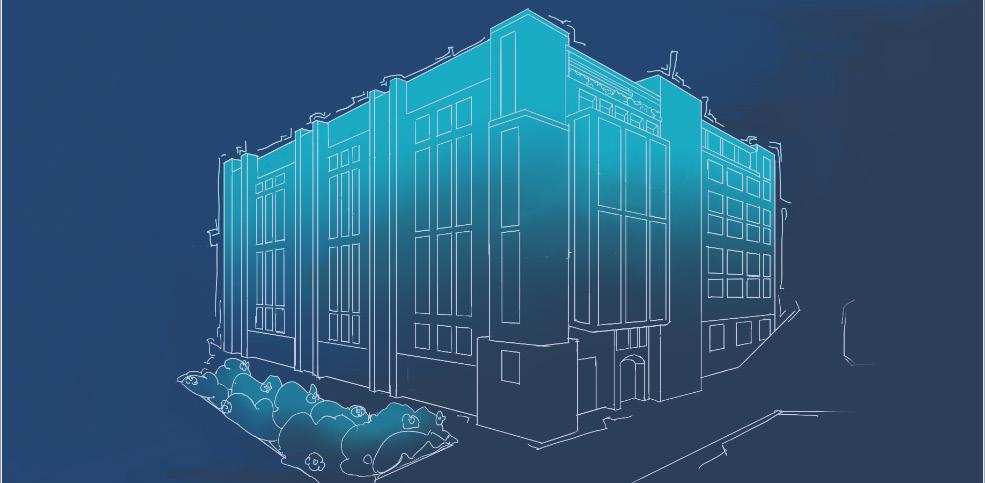
Love Thy Neighbor: Students Adapt to Housing Scene Amid Social Life, Neighborhood Concerns
Students say changes to the university Code of Student Conduct and neighborhood policing have discouraged social activity both on and off Georgetown’s campus.
Opal Kendall, Bridget Galibois and Ajani Stella
Deputy Features Editors and Senior News Editor
Kiran Marsh (SFS ’28) was celebrating a friend’s birthday in Village A when a residential assistant (RA) knocked on the door to investigate a noise complaint.
Marsh said the complaint came as a surprise.
“This is pizza and brownies at nine o’clock on a Thursday. We’re playing some music— it’s pretty loud, but it’s nothing crazy,” Marsh told The Hoya. “We were just hanging. It’s 15 of us just watching baseball.”
Marsh, who also has received two noise citations, said that students are experiencing harsher restrictions on their social life.
“It feels like they’re just anti-fun for no reason,” said Marsh.
This year, Georgetown University amended the Code of Student Conduct to instruct residential assistants and community directors (CDs) to avoid informal warnings and instead submit incident reports for each violation, a process that could result in formal citations. In the past, staff could warn students about their noise levels without writing a formal complaint, allowing students to course-correct without involving the conduct process.
Off campus, students fear reports from the Student Neighborhood Assistant Program (SNAP), a university program proactively addressing community concerns about off-campus student behavior by patrolling surrounding neighborhoods.
In this landscape, students say they have adapted by shifting parties earlier in the evening, limiting event size and calling on the university to ease some limits on social gatherings in a recent Georgetown University Student Association (GUSA) referendum. Darius Wagner (CAS ’27), Georgetown University Student Association (GUSA) vice president and president-elect, said the university’s policy changes limit student activity both on and off campus.
“It makes everybody walk on eggshells; you want to have a night with your friends at the townhouse and you’re worried that it’ll be cut short,” Wagner told The Hoya. “Students are scared to host in spaces where they receive citations, and fear going through a conduct process.”
However, permanent neighborhood residents oppose relaxing current regulations.
Karen Cruse, who has lived in West Georgetown since the 1970s, said the referendum’s proposed changes could disrupt neighborhood life, compromising recent improvements in student-neighbor relationships.
“What we don’t want is any amplified sounds coming from campus or students and violating our quiet, our quality of life,” Cruse told The Hoya. “Anything that would lessen that would not be taken well by the community.”
Despite neighborhood pushback, students have called for greater social freedoms while administrators advocate heightened regulations.
A university spokesperson said Georgetown is committed to ex-
panding on-campus housing options for seniors and addressing neighborhood concerns.
“The new addition of Hayden and Byrnes Halls, along with the renovation of Henle Hall, are part of the university’s goal to provide more housing options for juniors and seniors,” the spokesperson told The Hoya Discipline in the Dorms
As residential living employees enforce the conduct guidelines, students said increasingly stringent restrictions stifle their on-campus social life. Simultaneously, RAs have expressed pressure from the university to monitor dorms and strictly enforce The Code of Student Conduct.
John Lock (SFS ’28), an RA in Village A, said he was surprised to learn during university-led RA training that RAs were to omit informal warnings in favor of incident reports, a break from previous years.
“Last year it was more informal,” Lock told The Hoya. “But this year, they have made it more official that you do the citation first — I’ve been told that you’re supposed to issue that citation immediately.”
Amendments to the Code of Student Conduct created a formal citation process for housing violations, requiring RAs and CDs to submit incident reports for every violation, according to three RAs. The code also holds all residents present accountable, regardless of whether they were directly involved in the violation.
A citation’s severity depends on the specific violation, with possible violations including excessive noise, unauthorized guests and unauthorized parties. The incident reports then enter into the formal disciplinary or educational conference process.
Anna Holk (CAS ’27), who has been an RA in Reynolds Hall and Nevils, said the increase in directives has damaged the relationship among the university, RAs and students.
“My experience last year allowed me to build a more positive relationship with my residents, because I could be more reasonable about giving them a chance to correct any behavior that might have been bothering others,” Holk told The Hoya “Instead, that has to go through the community director, and I think it kind of makes it difficult for RAs and residents to build trust.” Lock said the new guidance forces RAs to report any infractions, which he sees as policing students and straining the relationship between RAs and residents.
“It makes it more like we’re cops,” Lock said. “Before, you could give out informal things and you’re helping them out. But now students can definitely see it more as an adversarial relationship in terms of conduct, because no matter what happens, the code is you need to give a report.”
“In previous years, there’s more of a chance for students to react, change what they were doing,” Lock added. “But this year, we have to document what’s happening.”
Ethan Henshaw (CAS ’26), GUSA president, said students
who received citations may avoid hosting in the future for fear of more severe repercussions.
“Once you’re in that process, the first time, you’re obviously more hesitant to throw a social event the second time,” Henshaw told The Hoya. “Imagine your roommate has a birthday party or something like that, now you can’t have a social event, because if you do, the repercussions are significantly more severe, even though you’ve never even thrown anything before.”
Marsh said the RA who issued the complaint informed him she was required to do so.
“She was like, ‘Gun to my head, I have to do this.’ Like there’s nothing she could do, because there’s a record of somebody calling in, so she has to cite us,” Marsh told The Hoya Wagner said on-campus restrictions encourage students to move parties off campus, where they fear SNAP.
“With SNAP, it’s easy to say that it’s probably going to be safer to host on campus,” Wagner said. “But with the increase in citations and crackdowns on the on-campus side, we’re seeing a decline in both.”
Knock, Knock
While Georgetown students have looked to off-campus areas for greater social freedom, the surrounding neighborhoods have not always been welcoming.
For permanent residents of the Georgetown neighborhood — including West Georgetown, Foxhall and Burleith — regulating student conduct has been key to improving relationships with the university, which used to be much more adversarial.
Cruse said the community did not feel the university was regulating off-campus student behavior in the 1980s and 90s, which fueled animosity from neighbors.
“If you had flowers planted out front, they’d be picked up and thrown around,” Cruse said. “I have to laugh when I see all the pumpkins and gourds people are putting on their front steps now, because you wouldn’t dare to put it up out before Halloween evening, and then you’d be lucky if you made it to the next morning with the pumpkin still on your front steps, not smashed down the block.”
The Georgetown Campus Plan, a strategic proposal for enrollment and development, must be approved by the D.C. Zoning Commission every 10 years. It has been an outlet for neighborhood grievances, often compounding into legal fights.
In 2010, the university and Washington, D.C., formed the Georgetown Community Partnership (GCP), a forum between students, university administrators and community leaders, to ameliorate these tensions. In 2016, the GCP successfully negotiated the 2017-2036 campus plan, which was endorsed by all relevant citizens’ associations.
Since 2001, Georgetown has increased its enrollment by approximately 1,500 undergraduate students, including an additional 300 students who live off campus each year, according to university data.
To mitigate concerns about university expansion, the plan capped main campus undergraduate enrollment at 6,675 and required Georgetown to maintain beds for at least 550 undergraduate seniors, aiming to fill 95% of them. According to the plan, Georgetown must “work to develop additional strategies and incentives” alongside the GCP if it does not meet the 95% threshold in any semester.
To address neighborhood concerns, the university has adopted different strategies to attract seniors back to campus and expand undergraduate enrollment.
Nico Hohman, Georgetown’s director of construction, previously said the GCP helped develop plans for the renovated Henle Village, which opened in Fall 2025, to encourage more students to live on campus.
“One of the things of the university being a part of that is we want to be a good neighbor, and part of that is understanding that the neighborhood prefers when students are on campus,” Hohman told The Hoya during a tour of Henle in February. “The university just didn’t have enough physical beds to be able to house all students on campus.”
“The idea was to attract seniors back on campus,” Hohman added.
In recent years, the university has also expanded its downtown Capitol Campus, including moving undergraduate programs, thereby reducing the number of students who would live on the main campus. In July, the university updated the campus plan to exclude undergraduates studying at the Capitol Campus from the on-campus housing headcount.
The campus plan also solidified SNAP, which was originally piloted in 2005, as an additional enforcement mechanism for student conduct.
Since the GCP was formed, the number of SNAP interventions has steadily decreased each semester, according to data from the university’s Office of Neighborhood Life. Data is not available for the Spring 2025 or Fall 2025 semesters.
Students living off campus who receive at least three conduct violations for excessive noise may lose the “privilege of living off-campus,” forcing them to relocate to on-campus housing, according to the Code of Student Conduct.
Lauralyn Lee, Georgetown’s former assistant vice president for strategic initiatives and planning and a principal architect of the GCP, said the university and the community became less antagonistic to one another as a result of SNAP and GCP.
“One of the great advantages that emerged as a result of this process is that the issues became less ‘us against them,’ and more a shared understanding of complexity,” Lee told The Hoya “So fundamentally, our neighbors weren’t unreasonable, and neither were our students, and the university wasn’t trying to be unreasonable.”
Eric Langenbacher (GRD ’02) — a Georgetown government professor and president of the Burleith Citizens Association, a group promoting neighborhood interests — said the universi-
ty used the GCP to take a more active role in regulating student conduct.
“I think that the university essentially took a very laissez-faire approach before then to students living in the neighborhoods around the university,” Langenbacher told The Hoya
“Now that there’s more oversight and more regulation, it really has improved things from the perspective of the community,” Langenbacher added. “I know that opinions differ within the student body, but I think that it’s also been good for students as well.”
No Place to Party
For many Georgetown students, however, this peaceful relationship has come at a cost: declining student life and increasing self-policing as they fear SNAP complaints and university reprimands.
Daniel Tomas (SFS ’26), a Georgetown University senior living off campus in Burleith, said he was excited to host a Nov. 6 opening night cast and crew party for the student production “Heathers: The Musical.”
However, the presence of SNAP in the neighborhood discouraged Tomas from hosting. Tomas said this presence of SNAP patrols has created a climate of fear that deters students from throwing social events off campus.
“It has been a big no-no, the idea of hosting any single event in my house, simply because I know the university would just come and shut it down, even if we follow D.C. laws and regulations regarding noise,” Tomas told The Hoya. “The university has a very broad policy in terms of noise that could immediately just get us a warning or a violation.”
“For everyone who’s living off campus, we’ve heard and also noticed from experience how aggressive SNAP has been with its policies,” Tomas added.
Elliot Anderson (CAS ’28) said he has been to off-campus events where SNAP was called, including performances for student bands and parties with limited noise.
“The music was so quiet that you couldn’t even hear it,” Anderson told The Hoya. “It was a no-phones party, so it was pretty much just everyone talking, and still, somehow SNAP came and shut the party down before it even hit midnight.”
SNAP both responds to helpline calls from neighbors and patrols for conduct violations proactively, which Henshaw said leads to overpolicing of student social life, even when student activity does not impact neighbors.
“If the neighbors are not calling, and SNAP is just driving by, when it very clearly wasn’t even a problem yet, why not just knock on the door and be like, ‘Time to quiet down,’” Henshaw said.
Many students said they view the years-long decrease in SNAP interventions as a reflection of the chilling effect the enforcement has on student life.
Anderson said that permanent residents’ use of SNAP discourages students from hosting social and extracurricular gatherings.
“People are potentially rightfully scared of them,” Anderson said. “My one friend who had his Tombs night
shut down has yet to host since for anything. Another place, my band was going to do a show there, and we never got the opportunity to because the house got SNAPed.”
Residents face escalating consequences for each SNAP citation, including conduct probation, property party restrictions, required community service, and potential loss of off campus living privileges and suspension. Joe Massaua (SFS ’25) — a former commissioner on the Advisory Neighborhood Commission (ANC) 2E, a local government entity that represents the Georgetown, Burleith and Hillandale neighborhoods — said strict off-campus regulations make it difficult for students to have a fulfilling college experience.
“Students are hesitant to host because the university advertises these sanctions so strongly if you step anywhere out of line,” Massaua told The Hoya. “Fun falls by the wayside because the university has scared students.”
Amid these increasing concerns, Massaua said the GCP is no longer an effective liaison between residents and students.
“The Georgetown Community Partnership currently does not adequately represent student interests because the university doesn’t make a genuine commitment to training students or inviting students into relationships with the community,” Massaua said. Henshaw said that by eliminating viable party spaces, the university is harming student culture.
“It’s having damaging effects on community, and is preventing organizations from coming together and students from having social events together, in a way that I think is very counterproductive for building a college campus where life is good and where people are happy to be here and where the culture is positive,” Henshaw said. In the Oct. 22-24 GUSA election, students overwhelmingly passed the Restore Student Life Act, a nonbinding referendum requesting that Georgetown repeal changes to the student code of conduct, allowing one notice for noise complaints, extending quiet hours from midnight to 1:30 a.m. on weekends and renegotiating noise restrictions with the surrounding neighborhoods.
Tomas said the threat of SNAP looms over off-campus gatherings.
“Even though we’re all just sitting down in a circle and talking, we have the threat of SNAP coming and saying that we’re being too loud or that there’s too many people in the house and it seems like a party, and us getting shut down and then receiving a violation,” Tomas said.
“Because of university policies, we are deterred from actually getting together and really sharing with each other,” Tomas added. Marsh said he no longer hosts gatherings in his dorm since receiving citations.
“I’m not even more afraid, just I don’t anymore — I’ve limited my social life that I was expecting to have for my dorm,” Marsh said.
ILLUSTRATION
UBC Professor, Psychiatrist Examines
Daily Psychology Factors, Health Effects
Ruth Noll Senior Science Editor
Nancy Sin, a health psychologist and associate professor of psychology at The University of British Columbia, presented her work exploring the impact of daily ups and downs on health and well-being at an Oct. 24 event.
The lecture was part of the psychology department’s colloquium series, which features speakers from inside and outside the Georgetown University psychology department. Sin explained the relationship between emotional stressors — positive and negative — and our health and experiences.
Sin said daily events are rarely entirely positive or negative.
“The thing that I found really surprising was that 34% of days, people report at least one stressor and at least one positive event,” Sin said at the event. “And I think that’s what this is reflecting, is that it’s pretty typical for adults to just have these days that are really full and that maybe having a lot of stressors means that you have an active and engaged life, but that opens you up to both stressful and positive experiences.”
Sin said this events-based approach is important not only for understanding how these negative
events interact with emotions and the environment people are in, but also for considering positive events.
“If we were thinking about how stressors unfold in daily life, you might also think about things like pile up, having multiple stressor events that pile up across the day, or across multiple days or even longer periods of time.
But I am interested in also unpacking this for positive events,” Sin said.
Jessica Chiang, an assistant professor in the psychology department, said this process brings a new perspective to this study of stressors and positive emotions.
“Her work brings a very nuanced perspective to the study of stress and resilience and reminds us that the small, everyday, mundane experiences that we have can have profound, long-term impact on our physical health,” Chiang said at the event.
Sin added that it is especially important to focus on positive events because they can help buffer the effects of negative events throughout the day.
“It’s thought that positive emotions could help to allow people to be less reactive to stressors. So that’s like a buffering effect, or promotes faster recovery following stressor exposure,” Sin said.
Niyat Theodroes (CAS ’27), a student who attended the event,
said she appreciated the focus on positive events, compared to what she has been learning about in her psychological disorders class.
“We have been focusing on depression and mood disorders, so looking at mood and emotions from the perspective of positive feelings instead of negative ones felt like a completely different approach,” Theodroes wrote to The Hoya. “It was interesting to hear about her research and how the amount of positive emotions we experience or report can actually have an impact on us.”
Sin said sleep is an equally important element of well-being that she considers when inspecting positive and negative events.
“There are aspects of this that I think are really relevant for students, like when sleep gets really disrupted,” Sin said. “Your cycle kind of gets very shifted — there could be a lack of regularity, especially on weekends versus weekdays.”
Sin said no matter the amount of sleep one gets, individuals will still experience an increased negative effect in the face of a stressor; however, people who sleep better experience a smaller dip in their positive affect when faced with a negative event.
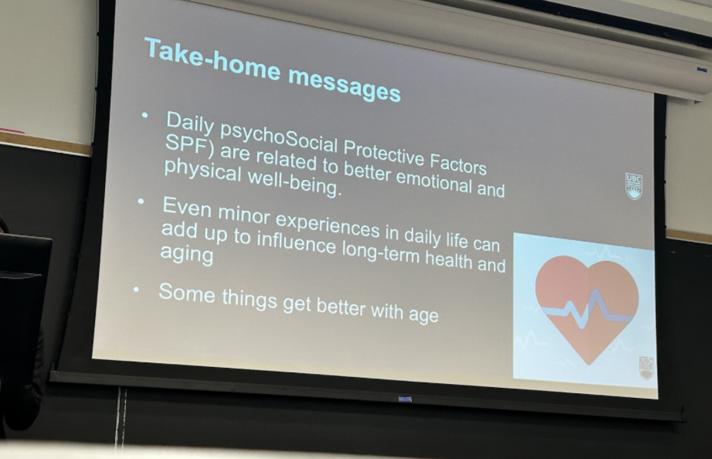
“If you have one hour longer sleep duration than you typically would, then the next day, if you have a positive experience, you actually emotionally benefit more from that positive experience,” Sin said. “And so this is kind of showing to us that people are getting more out of their lives, they’re benefiting more from positive experiences when they’ve had more sleep.” Sin added that, during the pandemic, she was interested in the impact of increased everyday discrimination on
Weiner Lab Explores Novel Cancer Immunotherapies
Adhithi Rajesh Deputy Science Editor
Researchers in Dr. Louis Weiner’s lab at the Georgetown University Lombardi Comprehensive Cancer Center are examining possible methods to fight immune resistance in solid tumors, looking specifically at pancreatic cancer, one of the deadliest and most treatment-resistant cancers.
Weiner explained the importance of targeting pancreatic cancer specifically through this research.
“Our current research focuses on pancreatic cancer, which is poised to be the 2nd leading cause of cancer death (after lung cancer) in the United States by 2030,” Weiner wrote to The Hoya
One branch of the lab’s research focuses on using a combination of immunotherapies to break through pancreatic cancer’s dense fibrosis, the hardening of tissue surrounding a solid tumor. The fibrosis shields pancreatic cancer cells from the body’s immune response and from most chemotherapies.
Weiner said the lab’s current work centers on two critical strategies to treat metastatic pancreatic cancer.
“Our current efforts focus on two key areas, both of which attack the profound fibrosis found in pancreatic cancers that is responsible for the cancer’s poor responsiveness to chemotherapy and immunotherapy,” Weiner wrote.
To combat this resistance, Weiner said the lab’s recent work has paired immune checkpoint antibodies — which help immune cells called T-cells recognize and attack cancer cells — with a novel drug called BXCL701 that enhances the immune response and reduces cancer-related fibrosis.
“In experimental models, the combination works well, and we have recently completed a clinical trial in patients with chemotherapy-resistant advanced pancreatic cancer, with encouraging findings that have not been seen previously for immunotherapy in this setting,” Weiner wrote.
The lab’s second major line of research looks at ways to weaponize natural killer (NK) cells, immune cells that can directly kill cancer cells, to infiltrate the fibrotic tissue surrounding tumors.
“We recently published a paper showing that forced overexpression of a gene that encodes fibroblast activation protein, an enzyme that digests collagens that can cause tumor fibrosis, significantly increases NK cell related invasion into pancreatic tumor masses in experimental models, and improves the therapy of those tumors,” Weiner wrote.
Researcher Nuan Wang (GRD ’25) said her current work in the Weiner Lab focuses on ways to overcome the suppressive tumor microenvironment and aims to make immune-based treatments more effective for patients with solid tumors.
“Our lab focuses on understanding the mechanisms of immune resistance in solid tumors and developing strategies to enhance the efficacy of immunotherapies,” Wang wrote to The Hoya. “I’m working with a project examining how protease expression in NK cells influences their infiltration and cytotoxicity in pancreatic ductal adenocarcinoma models.”
Weiner said this approach, which enhances antibody-dependent cell-mediated cytotoxicity (ADCC), an immune mechanism where antibodies bind together to cancer cells and recruit NK cells, could have broad applications for cancer immunotherapy.

“By giving NK cells the power to penetrate into tumors, the full potential of ADCC as an anti-tumor mechanism may be better unleashed,” Weiner wrote. “Current experiments are testing this possibility.”
In the broader field of cancer immunotherapy, treatments like checkpoint inhibitors and CAR-T cell therapy have transformed care for cancers, such as melanoma and leukemia. However, the success of these techniques in treating solid tumors has remained limited because their dense and suppressive tumor microenvironment prevents immune cells from effectively attacking cancer cells.
Weiner Lab’s research aims to overcome these barriers and extend the benefits of immunotherapy to cancers long considered unresponsive.
Research assistant Chloe Luwa (CAS ’27) said working at the Weiner lab has given her a new appreciation for cancer treatment development.
“I’ve seen more of the clinical aspects and side effects of cancer
treatments during my work as an EMT, but doing research for the Weiner Lab has exposed me to another aspect of cancer treatment,” Luwa said. “Being a part of the lab makes me realize how much work goes into the medications and treatments we have today and gives me hope for a brighter future as cancer treatments continue to progress.”
Wang said the research in Weiner’s lab is vital for real-world innovation, specifically the future of treatment-resistant cancers.
“By uncovering the molecular mechanisms that regulate immune cell activity and testing engineered immune cells in relevant models, the lab contributes directly to the development of next-generation immunotherapies,” Wang wrote. “These efforts have strong translational implications and the potential to improve outcomes for patients with cancers that remain resistant to current treatment modalities.”
Taking Fifteen Minutes or Longer Walks Assosciated With Improved Cardiovascular Health, Study Finds
Angela Lekan Senior Science Editor
A recent Annals of Internal Medicine study published Oct. 28 found an association between taking longer walks and a decreased risk of cardiovascular events. In a study examining 33,560 healthy adults in the United Kingdom, researchers found that individuals who went on daily walks that lasted 15 minutes or longer experienced a significantly reduced risk of cardiovascular events than individuals who went on shorter walks. Cardiovascular disease includes many conditions affecting the heart and blood vessels and is the leading cause of death in the United States. Walking has previously been shown to improve cardiovascular health, with an August 2025 study reporting that adults who walked 7,000 steps a day had a 25% reduced risk of cardiovascular incidents compared to people who only walked 2,000 steps daily. The new study expands on this data by demonstrating that the way an individual reaches
those benchmarks can also impact health outcomes.
Erin Song (CAS ’28), a biology of global health student, said walking is an especially useful form of physical activity for students who often walk long distances across campus each day to get to class. “Walking is an easy, accessible way to get exercise in,” Song wrote to The Hoya. “And because I have to walk between classes so much every day, it’s nice to know that this unintentional exercise is supporting my heart health.”
Nadya Kotlyarevska (CAS ’28), a student studying biology, said Georgetown students can easily benefit from the positive effects of walking, given that the Georgetown area — and Washington, D.C., as a whole — is very walkable. “I think this study is super applicable to GU students! Since we live in a very walkable city and a walkable campus, it is reassuring to know that my daily class routine or walk to Safeway is beneficial,” Kotlyarevska wrote to The Hoya The recent Annals findings demonstrate that the way people attain daily steps and the duration
of their walks may also impact their health. After following up with participants several years after the study, they found that individuals who accumulated most of their steps through longer walking bouts of over 10 minutes had more greatly reduced cardiovascular disease incidence compared those who only walked for bouts lasting less than 10 minutes.
Borja del Pozo Cruz, co-lead author of the study, said in an interview with NBC News that the researchers decided to use steps as a parameter because they are easy to measure.
“Everyone can essentially measure steps with their smartwatches or smartphones or pedometers or whatever,” del Pozo Cruz said. “We thought focusing on steps would be much more impactful because their translation is immediate.”
A study conducted by the Pew Research Center in 2019 found that nearly one in five adults in the United States use wearable fitness trackers or similar methods to record their step count.
Song said she regularly uses health apps on her phone to track her steps.
“I try to get 10,000 steps a day and the Health app on my iPhone is the easiest way to track this,” Song wrote.
Alexa Garber (CAS ’28), a student studying neurobiology, said tracking steps can also be a helpful tool to remind students to move during the day in order to maintain an active lifestyle.
“I’ve found that checking the step tracker on my phone daily helps remind me to get up and be active during the day,” Garber told The Hoya
The Annals study found that the benefits of a longer walking duration were more pronounced in less active individuals who walk less than 5,000 steps per day than in more active people, who walked between 5,000 and 8,000 steps daily.
Garber said these findings emphasize the importance of living an active lifestyle, something that may be difficult for students who spend much of their time sitting in class or doing schoolwork.
“I think this data is a wakeup call for myself and other young adults,” Garber said. “We spend lots of time sitting on our phones or in class, but it is so important to move every day.”
positive and negative emotions.
“People who experience more experiences of everyday discrimination or unfair treatments tend to have more health risks, including poor sleep, higher blood pressure, dysregulated cortisol, metabolic risks and even measures of accelerated aging, like shorter telomere length,” Sin said. Sin said positive events experienced throughout the day lead
THE POLICY PROGNOSIS
Middlemen for Pharmacy Companies Create Clauses That Make Consumers Gag
Shiva Ranganathan Science Columnist
Fixing the U.S. health care system is becoming more difficult amid the constant addition of new health models, which has prompted debates about how to regulate these models while protecting patients from high costs.
People ages 18 to 34 are among the most uninsured in the United States. The rise in non-government-provided health care coverage has primarily been through student enrollment in employer-sponsored health insurance (ESI).
ESI plans, health benefits paid for by a company, are subject to different restrictions in every state. The Employee Retirement Income Security Act of 1974 (ERISA) places federal protections on ESI to protect enrollees in these plans. ERISA sets minimum standards for the insurance plans employers provide and fosters trust between insurance holders and managers. Without ERISA’s oversight, funds initially meant to supply employees with health care go toward malicious private sector actors seeking profits. Patients are left with less insurance money to buy medications and must forsake higher-cost treatments that could significantly reduce their quality of life.
Pharmaceutical benefit managers (PBMs), third-party administrators of drug benefits, negotiate prices with pharmaceutical companies offering the drug to the insurer’s plan. Many have criticized PBMs for prioritizing profit over patient access to affordable prescriptions.
Fraudulent practices like spread pricing allow PBMs to inflate costs and pocket revenue from consumers. The resulting out-of-pocket costs, which are often many degrees higher than they would otherwise be, fall to consumers, forcing countless people to forgo life-saving medications.
Delays in receiving medications while waiting for PBM dispensing or authorization cost patients their lives.
Gag clauses are another practice PBMs use to occlude drug price negotiations. These are contracts prohibiting drug companies from telling patients if prescription medications cost less when paid for with cash than when paid for
by the patient’s insurance company or employer. In a 2016 survey of over 600 pharmacies, 39% of respondents indicated that gag clauses prevented them from informing patients of lower costs. In 2021, the Consolidated Appropriations Act outlawed gag clauses by preventing health insurance administrators from restricting pricing information to consumers. Additionally, insurers must now share all relevant pricing data with trusted partners like business associates that invest in the insurance plans and hospital systems benefitting from the plan, as long as sharing the data complies with privacy laws. While the Consolidated Appropriations Act theoretically curbed the influence of gag clauses and generally promoted transparency, PBM contract templates have continued to deceive and misinform health plans. PBMs have gotten around regulatory legislation like the Consolidated Appropriations Act by filling contract templates with complex financial jargon, obscuring price transparency when insurance providers use said templates. PBMs functionally operate as competitors in the health care market and have monetary incentives to provide drugs to insurance companies at higher costs. These contract templates often include private data clauses that — though they are not legally gag clauses — effectively limit patient access to price data. Enforcement is still a work-inprogress and is not yet effective. The Consolidated Appropriations Act requires insurers to complete an annual form attesting that they do not employ secret gag clauses. However, the legislation lacks actual enforcement provisions, saddling patients with the burden of uncovering and responding to deceptive practices. While PBMs continue to ignore insurance law without penalty, insurance managers exploit patients and providers. The administration of health care should not fall on the shoulders of those who stand to benefit from price-gouging and reducing care quality, no matter how well-hidden the provisions enabling them might be.

RUTH NOLL/THE HOYA
WIKIMEDIA COMMONS
Researchers in Dr. Louis Weiner’s lab are examining methods to fight immune resistance in solid pancreatic tumors.

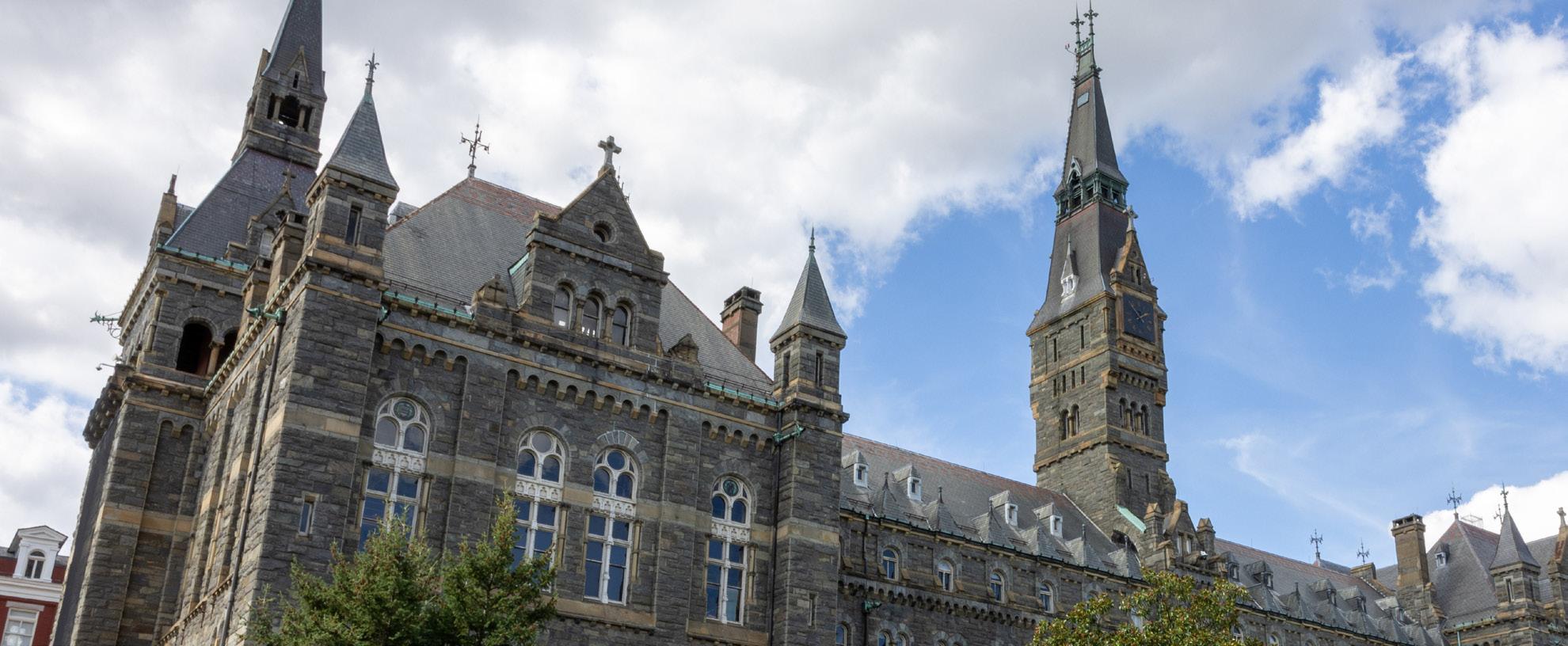
arts
Former US Senator Pushes Democrats
Prioritize Relatability, Engagement
Nicolas Abreu Events Desk Editor
Former U.S. Sen. Laphonza Butler (D-Calif.) called on the Democratic Party to modernize outreach efforts toward younger voters at a Georgetown University event Oct. 28.
Butler criticized Democrats’ disconnect with voters, shared her concerns regarding turnout in upcoming legislative elections and encouraged women to pursue careers in politics in conversation with Donna Brazile, former acting chair of the Democratic National Committee (DNC). The event was a collaboration between Georgetown’s Institute of Politics and Public Service, Georgetown University College Democrats (GUCD) and Georgetown’s women’s and gender studies program.
Butler said her biggest concern for the upcoming election cycle is voter turnout.
“What’s keeping me up at night is, will we see a return in turnout?” Butler said at the event. “It wasn’t that Donald Trump got more votes than last time. It was that more people stayed at home in 2024. From everything that I’ve heard from folks who are on the ground doing work, that they’re seeing a renewed energy. I do hope that we see a surge in turnout, particularly amongst young voters.”
Governor Gavin Newsom appointed Butler to her seat in October 2023, just days after then-incumbent Sen. Dianne Feinstein (D-Calif.)
Nicolas Abreu Events Desk Editor
Three drivers for the Georgetown University Transportation Shuttle (GUTS), Georgetown’s shuttle bus system, condemned the university’s proposed plan to transfer drivers to a third party that would reduce employee benefits at an Oct. 24 panel. The GUTS drivers criticized the university administration’s communication with employees and argued the plan would harm the Georgetown community and the drivers’ families. The Georgetown Coalition for Workers’ Rights (GCWR), a student organization that advocates for labor issues on campus, hosted the event to highlight the lives of individual drivers who would be impacted.
Noel Tiongson, a GUTS driver since 2001, said Georgetown and Chief Operating Officer (COO) David Green’s approach to subcontracting the drivers is unfair to the drivers because it lacks transparency.
“He didn’t even seem to really regard us as substantially important enough to at least be approached and really notified,” Tiongson said at the event. “It goes against my experience with Georgetown promoting the notion of cura personalis. We’ve always had this belief that the students that attend the university are supposed to project their learning to the greater world.” The proposed plan, which The Hoya initially reported in September, would subcontract GUTS drivers with the private company Abe’s Transportation. GUTS drivers would no longer be directly employed by the university and lose access to most university
died. Prior to her term, Butler was the president of the Service Employees International Union (SEIU) Local 2015, California’s largest labor union, and served as the president of EMILYs List, a political action committee that aims to elect Democratic female candidates.
Butler said she believes voters are growing disillusioned with the party because its leaders do not feel genuine.
“I think that we have an authenticity problem,” Butler said. “I don’t mean this in a pejorative way, but I think the characters that get displayed as the leaders of the Democratic Party just are clearly seen as performers in a lot of ways. I know a lot of these people, I know their hearts, I know they are well-intended, and I know that there’s a lot of energy and effort that they put into leading a party. But when you put in all of your energy and effort and nobody believes you, sometimes energy and effort ain’t enough.”
Brazile, who served as acting DNC chair during 2011 and from 2016 to 2017 and currently works as an ABC News contributor, said this disconnect was apparent in the party’s failure to reach voters in 2024.
“Trump was everywhere, and people heard him,” Brazile said at the event. “We were back to putting information on traditional news channels and traditional media, and they were in podcasting. They were talking to everybody, everybody. Trump was 24/7. So I think we made
benefits, including the university’s health insurance and retirement packages. The university has not yet formally announced if it will implement the plan.
Micaeli Dym (SFS ’26), one of the event’s organizers and GCWR member, said the panel aimed to raise awareness for how the university’s subcontracting plan would affect drivers.
“The Coalition for Workers’ Rights, the community as a whole and the workers wanted to spotlight the stories and the experiences that workers have had over their up to 30 years of service and also hear personally how this change is impacting their daily lives,” Dym told The Hoya. “It will impact their lives, their family members, their children and their plans for the future.”
“I think highlighting and spotlighting those most affected by these changes is really important in making sure that their voices and their needs and demands come through in negotiations with the university and in making sure the university honors those demands,” Dym added.
The panel came one day after Georgetown’s Advisory Committee on Business Practices (ACBP) — a group of students, faculty and administrators that consult the office of the university president on the ethics of the university’s business and labor policies — advised the office of the president against subcontracting, saying the conversion to a new fleet of buses would pose a greater financial burden to the university than current driver wages.
Dym said the committee’s decision is a testament to the plan’s mistreatment of university employees because it violates Georgetown’s Just Em-
some honest-to-God mistakes.”
“We are paying a huge price for losing, but it was a failure to communicate, to listen and to really understand that we had to talk to young men, young people and others in ways that they understood,” Brazile added.
Roan Bedoian (CAS ’28), GUCD’s speakers department director who helped organize the event, said the event aimed to analyze the current path of the Democratic Party.
“There’s this question of where is the party going from here?” Bedoian told The Hoya. “Have we lost the working class? Have we lost voters of color? And so we wanted to address that because there was that interest from our club since the election and we felt like this was a great opportunity.”
“I was thinking it’d be great to bring the two of them together, especially because they are both predominant Black women in American politics and right now the Democratic Party is just not doing a good enough job with diversity,” Bedoian added.
Butler said elected positions are not the only way to serve in government and encouraged students to pursue public service.
“There are other ways to serve. If you have a calling to be a communications professional or a speech writer, do that in public service or in politics,” Butler said. “Don’t just fall into what exists. Create what you want, utilize your superpower and be authentic to who you are.”
ployment Policy, a commitment to fair and competitive compensation for full-time university employees grounded in Georgetown’s Jesuit values.
“The fact that this Georgetown board even saw the violations of the Just Employment Policy that were happening in the case of the GUTS drivers being subcontracted and made this recommendation, I think, is really big,” Dym said.
The university’s plan would force drivers to either shift to an Abe’s Transportation subcontract or move to a different university position, many of which pay less. Drivers have cited concerns over losing access to the university’s expansive health care and retirement benefits, saying they are uncertain about their future.
A university spokesperson previously said Abe’s Transportation will offer “comparable compensation and benefits” to affected drivers.
Michael Fleming, a GUTS driver of seven years, said he hopes he can continue to work for Georgetown.
“When I wake up in the morning, I want to come to Georgetown,” Fleming said at the event. “I want to see you guys. I want to see everybody. I want to get my laughs.”
In an email response to a Sept. 19 petition circulated by GCWR opposing the plan, Green said the university would move ahead with the plan, citing university financial constraints and a Washington, D.C. law requiring private bus fleets to convert to 50% low-orzero-emission buses by 2030 and 100% by 2045. A university spokesperson previously said remaining in compliance with the law without moving to a

More information is available on CampusGroups

Calista Oyerly
Special to The Hoya
Nearly 1,300 Georgetown University students, faculty and volunteers biked through the Washington, D.C. and Maryland hills Oct. 25 for BellRinger, an annual fundraiser supporting cancer research.
Through individual and team rides ranging from 25 to 100 miles, bikers raised money and awareness for cancer research at Georgetown’s Lombardi Comprehensive Cancer Center, the only federally designated clinical cancer research center in D.C. Riders committed to a fundraising goal and then raced 25, 50, 62 or 100 mile routes from Washington, D.C. to Gaithersburg, Md.
Henry Morgan (CAS ’26), who biked 50 miles, said he had a great time participating in the fundraiser, dedicating the race to his grandfather.
“My grandpa who had cancer died when I was one, so I was just riding for him,” Morgan told The Hoya. “Everyone should do it if they have the opportunity to.”
Kara Howey (CAS ’26) — who rode 50 miles in the fundraiser for Jack Crew, a group of students who take care of Jack the Bulldog — said the day served as a reminder of the power of community since the club raised over $6,000.
“There were eight of us riding, and we wrote the names of everyone we were riding for on the back of our jackets. I had the names of 11
third-party vendor would cost the university $60 million.
Dym said GCWR’s work to protect drivers and other workers is far from over.
“It doesn’t stop. We have to use this as a reason to keep pushing and keep the pressure on David Green because this recommenda-
close family members and friends who have been impacted by cancer,” Howey wrote to The Hoya
“During the ride, I kept telling myself how lucky I was to be able to participate in an event that would help so many people and reminded myself of all the strong people I had written on my jacket.”
Since it was founded in 2022, BellRinger has raised over $6.3 million for the Lombardi Center.
The Lombardi Center’s research focuses include brain cancers such as medulloblastoma and glioblastoma, colorectal cancer, the role of cellular RNAs in chemotherapy and tobacco use behaviors.
Morgan said he rode double the distance he completed last year, which was challenging but rewarding.
“It was definitely rough,” Morgan said. “The last hill I actually had to dismount and walk for a minute because I was like, ‘This is too hard.’” Catherine Van Dongen (MED ’32) — a member of the BellRinger fellowship program, a summer research program for Georgetown medical students — said she rode 62 miles this year with Georgetown medical and doctoral students.
“This is my second year doing BellRinger,” Van Dongen told The Hoya. “I knew I was in the tumor bio program and I’ve always been interested in cancer research, so it sounded interesting because it was a way to get involved in that community a little bit more.”
tion was given directly to his office,” Dym said. “We are all what makes Georgetown and what makes the Georgetown community, and it’s the administration that’s trying to break apart these beautiful bonds that Georgetown’s created.” Fleming said driving for GUTS is a deeply meaningful job.
Jonathan Gagnon (MED ’28), a second-year Georgetown medical student and BellRinger fellow, said he became interested in cancer research after his brother was diagnosed and treated for Hodgkin lymphoma a few years ago.
“He’s doing well now, but it really made a lot of interest to get involved in research and cancer specifically,” Gagnon told The Hoya. “It’s pretty close to my heart.”
“I just encourage more people to get involved,” Gagnon added. “I think it’s something that is going to continue to grow and so it’s definitely something exciting to be a part of.” Van Dongen said getting involved with BellRinger was a transformative experience.
“It’s been one of the biggest opportunities that I’ve had here so far as a medical student,” Van Dongen said. “I guess my main thing is that the sense of community was so strong there; that’s basically why I picked up biking.”
Van Dogen added that BellRinger incites passion for cancer research in all participants.
“You just know that everyone feels passionate, whether they’re a survivor or a researcher or just want to be a part of it somehow, everyone is really really passionate about it and that’s super cool to see and be a part of,” Van Dongen said. “I’m just grateful that Georgetown has this community, and they have it every year and I think it’s only getting bigger.”
“I know y’all probably got some friends who got a degree working over here and that they’re like ‘Oh, hate it so much’,” Fleming said. “I mean, it’s nothing like having that. When you have a job that you like coming to every single day, there’s nothing like it, nothing.”
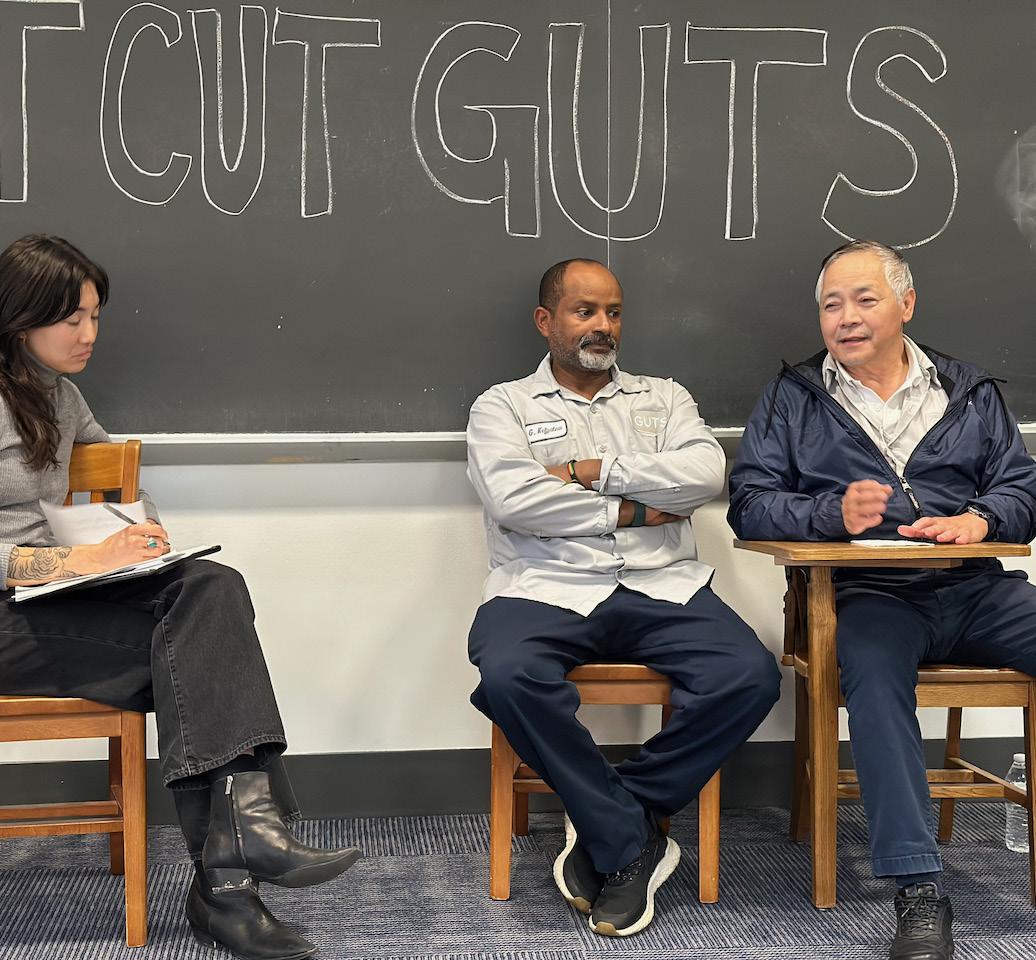
The Hoya Gala
The Hoya Gala will take place Nov. 22 at the Planet Word Museum, featuring Karen Travers (COL ’00, GRD ’03), a White House correspondant for ABC News, as the keynote speaker. Scan the QR code to donate to support our gala and journalism, and check out CampusGroups to buy tickets in advance.
and The Hoya’s social media.
GU Facing Project Financial Loss, Drop in International Graduate Students
BUDGET, from A1
Groves added that the federal government’s “new visa and immigration policies contributed to a steeper decline than anticipated” in international graduate student enrollment. About 1,780 international graduate students are enrolled at Georgetown for Fall 2025, according to university data, a decrease from around 2,170 in Fall 2024.
Groves said overall graduate student enrollment is only down 3%, which he partially attributed to the university’s tuition discounts for laid-off federal workers and recent graduates.
“There was some success in our offering tuition discounts to some laid-off federal workers and recent Georgetown alumni, but that means reduced revenue per student,” Groves wrote.
“Further, some programs offered online classes for students with delayed visas. Great uncertainty remains about whether there will be a multi-year reduction in international students.”
Crystal Luo, an Asian American professor in the history department, said international students are vital to the university community.
“It is a huge loss, not just
financially but intellectually and socially, to our university community when international students decline to enroll or are unable to get visas,” Luo told The Hoya. “It’s something that I think we should all be really concerned about for reasons that go beyond the bottom line.”
In the email, Groves said the university would seek to increase graduate and nondegree certificate enrollment, reallocate restricted gift funds to support ongoing university activities and seek additional philanthropic support.
Groves also expressed concern over the financial impacts of the ongoing federal shutdown, which he said has delayed funding disbursements, and Trump’s tariff policies, which he said increased the costs of goods, services and utilities.
While the shutdown will not likely affect student aid and international student support, it may disrupt grant proposals, delay research funding and limit access to federal resources, according to an Oct. 1 email from Katy Button, the university’s associate vice president for federal government relations.
Jane Komori, a professor in Georgetown’s School of Foreign Service, said the university must try to better include faculty input in future budget decisions.
“I find it disconcerting that we receive without notice these kinds of emails that essentially dictate to us what is going to happen, rather than consulting with faculty, staff and students who are the stakeholders in all of this,” Komori told The Hoya
“This is where we work and spend all our time, and we have not only invested interest, but good ideas about how to run things, and we’re keen to share them,” Komori added.
Groves held two town halls with faculty in September to address concerns about the changes, but Komori said they were insufficient.
“There’s a performance of information sharing and consultation, but it doesn’t extend beyond the superficial,” Komori said. “So what we really need is for faculty, staff and students to be in the room when any big decisions about budget are being made.”
Kavin Sakthivel (GRD ’26)
— an international student from India and the president of GradGov, Georgetown’s graduate student government — said international students are central to Georgetown’s mission.
“Everything is catered to the common good, the global good,” Sakthivel told The Hoya. “So people from all around the world who are doing sort of great things in their countries are coming here to learn more about how to do more things better. If those people don’t come, we lose that.”
Groves said the university understands the impact of Congress ending GradPLUS loans, a federally managed student aid service for graduate students that will stop accepting new applicants July 1, 2026.
“GradPLUS loan features will end in July 2026,” Groves wrote. “That is certain. The office of the Chief Financial Officer is actively working on alternative mitigations for the change in the loan programs. However, the effect of this change on graduate applications for Fall 2026 remains unknown.”
In 2023, GradPLUS loans made up 32% of national graduate loan disbursements and 16% of students relied on them, according to a 2024 report from the Georgetown University Center on Education
and the Workforce. The report also found that 30% of students in graduate programs with tuition over $70,000, such as many of Georgetown’s programs, rely on GradPLUS loans.
Groves said the university’s cuts since April have permitted it to avoid large-scale layoffs, though he acknowledged the actions hurt some community members.
“I know that the mitigation actions of April (e.g., pausing of merit increases, hiring freezes) are painful,” Groves wrote. “We remain deeply grateful for your patience. It is important to acknowledge that the shared sacrifices we are making are essential to securing the University’s financial stability. This sharing has avoided the mass layoffs occurring at our peer universities.”
Many universities across the country have laid off faculty and staff amid financial strain, including cutting administrative and academic programs.
Afinogenov said Groves must provide assurances that the university will not lay off faculty and staff in the future.
“One thing we need is an assurance that there won’t be layoffs,” Afinogenov said. “Another thing that we need is a clear timeline and a clearer set of guidelines for how the funding freeze will become a funding thaw.”
Groves will provide another update to faculty and staff in November on the university’s financial situation in advance of the Dec. 31 assessment deadline, according to his email.
Sakthivel said he recognizes that Groves is in a difficult situation and values the email’s transparency, even though the update was worrying.
“The transparency that Dr. Groves mentioned earlier this year is really appreciated, and keeping us updated is good,” Sakthivel said. “On the other hand, hearing about the numbers was not very pleasing. We are in tough times, and the university is taking the measures that are required to keep our educational goals going.”
Groves said the uncertain legal and political environment has upended higher education and he is grateful for the university community’s work.
“These are disruptive times,” Groves wrote. “Your ongoing commitment to Georgetown’s honorable and good for the world.”
With Record Voter Turnout, GU Students Elect Wagner/Missaghi
GUSA, from A1 ballots — a 79.2% increase in votes cast from the 2024 GUSA election.
In the first round of rankedchoice voting, Wagner and Missaghi received 1,402 votes, Saahil Rao (SFS ʼ27) and Zadie Weaver (CAS ʼ28) received 1,143 votes and Luke Hughes (SFS ʼ27) and Mikey Williams (SFS ʼ28) received 395 votes. In the second round, after Hughes and Williams were eliminated, Wagner and Missaghi received 1,554 votes while Rao and Weaver received 1,386.
Wagner said the high voter turnout demonstrated strong student engagement in campus issues.
“There was record turnout on both sides, which is commendable, because students are engaged in the process,” Wagner said.
Rao said he wishes Wagner success during his time as student body president.
“Vice President Wagner has been a superb servant to Georgetown,” Rao wrote to The Hoya. “Best of luck to him in his administration. It was an honor to run against him.”
Many voters prioritized experience when casting their ballots, citing Wagner’s current role as GUSA vice president, Rao’s experience as GUSA senate speaker and Weaver’s experience as vice speaker. Hughes and Missaghi were not previously in GUSA, and Williams is a former senator.
Jillian Altherr (CAS ʼ29) said she voted for Rao/Weaver because of their senate background.
“The reason I voted for Rao/ Weaver was because of their experience in the legislative branch, so I had more faith that they would be able to get things done more easily,” Altherr told The Hoya Altherr added that she was concerned Missaghi had no prior GUSA experience.
“I just don’t know how much experience she has,” Altherr said. “It was never advertised to me that much.”
Missaghi is the vice president of internal for the Iranian Cultural Society and a leader for the pre-orientation program firstyear orientation to community involvement (FOCI) through the Center for Social Justice.
Saniya Bhagwat (SFS ʼ28), who voted for Wagner/Missaghi, said she trusts Missaghi’s leadership abilities.
“Experience is experience,” Bhagwat told The Hoya. “If someone has shown the qualities of someone who’s a good leader elsewhere, the skills are still transferable. She’s not
going to lose her ability to be a good leader just because she’s never been on GUSA before.”
Van Eyck said that despite his initial reservations, he is optimistic about the Wagner/ Missaghi administration.
“A lot can be done by GUSA, and I’m excited for, hopefully, what the Darius Wagner admin will do,” van Eyck said.
Wagner said he hopes to unify the student body around shared goals for improving the campus.
“I think nobody’s ever going to agree with 100% of the things I advocate for, but I do know that we all come around and want to make this school a better place, and that will be my mission,” Wagner said.

GU Students in Limbo, Awaiting Resumption of Federal Internships
SHUTDOWN, from A1
interning at the House was going to all these types of briefings, of issues that I’ve never known prior,” Tun told The Hoya.
“I just found that extremely fascinating, and it opened a lot of other avenues of, ‘oh, maybe I’m interested in pursuing health care policy or XYZ,’” she added. “Now, that door is kind of closed in regards to learning all these different new topics through briefings.”
Lukas Pitman (SFS ’27), a furloughed intern at the U.S. House of Representatives Appropriations Committee, said he has become increasingly disappointed at missing his internship as the shutdown progresses.
“It was definitely a needed break, especially with midterms starting,” Pitman told The Hoya. “But after one week, two weeks, then three weeks, eventually it was, ‘Okay, this has gone on long enough, I’ve had enough of a break, it’s time to get back to work.’”
A number of benchmarks throughout November are expected to increase pressure on Congress to reopen the government, including congressional staffers missing pay scheduled for Nov. 5, Obamacare enrollment opening on Nov. 1 and holiday travel being impacted by Transportation Security Administration (TSA) furloughs.
Still, students like Pitman are finding the extra time to be a source of relief, allowing them to focus on their schoolwork.
Pitman said he struggled to keep up with his classes while working in Congress.
“I’ve actually been able to focus more time on my classes,” Pitman said. “When we were in session, I really wasn’t able to focus on my classes. I wasn’t able to, just at the time, get all the readings done, do the assignments, maybe as I should have.”
“And I think now, during October, I’ve actually been able to focus a lot on the classes that this year, for the first time, are my major classes,” he added.
Anika Rahman (SFS ’26) said being furloughed from her unpaid Department of Commerce internship was similar to her Summer 2025 experience, when her State Department internship was canceled due to a federal hiring freeze.
Full disclosure: Anika Rahman previously served as a Guide Staff Writer for The Hoya
“I think from back in Spring, when I had my State Department internship rescinded, that was definitely more frustrating,” Rahman told The Hoya. “So it prepared me for this in a way.”
Rahman said that while she is unsure how to feel about the shutdown, she has nevertheless found more time to focus on schoolwork.
“Now that I have two days out of my week free, I’m certainly focusing more on school, getting assignments done way ahead of time,” Rahman said.
Some students, while experiencing this mix of emotions, said they were most concerned for federal workers struggling to afford basic necessities after pay deferments, as well as people expected to lose essential government services Nov. 1, such as recipients of the Supplemental Nutrition Assistance Program.
Sean Moran (CAS ’26), an unpaid intern in Sen. Kirsten Gillibrand’s (D-N.Y.) office who is currently furloughed, said he is more concerned about federal employees dependent on stable incomes than unpaid interns like himself.
“Just because we’re not essential employees, it doesn’t really have that much of an effect, but it’s very unfortunate that it’s happening to people that are living paycheck to paycheck,” Moran told The Hoya
Tun said the experience is particularly difficult because she was initially drawn to Georgetown for its access to public service work.
“One of the main reasons why I wanted to go to Georgetown was the professional aspect,” Tun said.
“My professional aspirations are closely related to government work, maybe foreign affairs, but because of the government shutdown, my professional experience working at
the House has been cut short, and it’s been disappointing considering that the process is pretty competitive to get into this opportunity.” Wyatt Adamovich (CAS ’28), a furloughed intern in Rep. Glenn Grothman’s (R-Wis.) office, said he feels inclined to turn to the private sector, though he would prefer to work in public service.
“This break has made me think about pursuing opportunities in the private sector because things like shutdowns can’t happen there,” Adamovich wrote to The Hoya. “One of the things that worried me about working in politics is the uncertainty of my employment. Previously, this had been because jobs depend on which party is in power, but now I’m realizing that the federal budget is another variable in this.” Cole-French said that although this period of uncertainty is worrisome and confusing, it is also a unique experience emblematic of a Georgetown education.
“As frustrating and annoying as it is, it is also just interesting to witness firsthand this sort of major event,” Cole-French said. “Because I think that is one of the other promises of Georgetown, is through its proximity to the seat of power, you just witness whatever sort of political drama is going on.”
“So even if I’m not getting to have the full hilltern experience, I’m getting to have a very authentically Georgetown experience by witnessing this major political event,” Cole-French added.
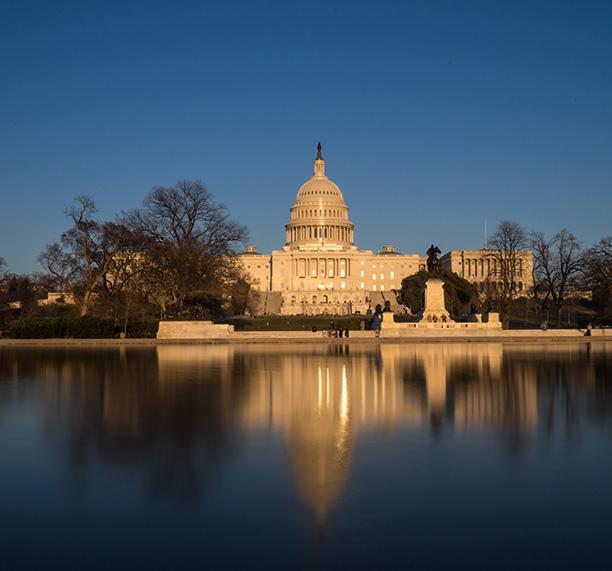
furloughed.
GU Students Mobilize for General Elections With Broad Implications
VOTES, from A1
political violence are some of the main issues for voters in Virginia, even in statewide and local races.
“I think it’s definitely the economy and jobs, obviously with a lot of federal workers being laid off and right now furloughed because of the shutdown,” Rankin told The Hoya. “I think that’s definitely taken a focal point in the campaigns. Another one is political violence, especially in the wake of Charlie Kirk’s assassination.”
“The campaigns had to react to both of those things,” Rankin added. “I think we’re seeing the response to both of those events, and that’s taken the center stage in both races.”
Jordan Smith (SFS ’28), a Democrat from San Diego, Calif., said she expects more local issues in California to influence the elections.
“I would say it’s the cost of living,” Smith told The Hoya. “I think that’s really big, especially in southern California — in the San Diego, L.A. areas. Tied along with that, I think homelessness is a really big issue for a lot of Californians, and that’s a real problem.”
Smith said she hasn’t heard many students discuss California’s election this year, including Proposition 50, a statewide ballot measure that would allow the Democratic state legislature to redefine congressional districts in response to a similar change by Texas Republicans.
“My roommate and I are both from California, we’re both very involved in politics, so we’ve been discussing Prop 50 quite a bit,” Smith said. “I’ve been discussing it with a lot of people from California, but I wouldn’t say I’ve heard a ton of buzz outside of that.”
“I don’t know if it depends where you’re from, who’s talking about what, but I’m very surprised how little mobilization there is for these smaller elections,” Smith added.
If California voters approve Proposition 50, the state would utilize
new congressional maps drawn by the legislature that are predicted to add five Democratic-leaning districts to the map. California’s Democratic leadership introduced the ballot measure in response to redistricting efforts implemented by Texas Republicans, which created five more Republican-leaning districts on its map.
Cash Moore (CAS ’28), a Democrat from New York City, said many students have taken an interest in the city’s mayoral election, which has garnered national attention due to Democratic nominee Zohran Mamdani’s unprecedented success.
“None of them are from New York, yet they have a lot of strong opinions on this mayoral race, which has been interesting to see,” Moore told The Hoya. “I think it’s rare that a mayoral race transcends into national politics, but this has been a great example. I think one of the reasons for that is obviously that Zohran has caught a lot of attention via social media, via young people.”
“It’s been fun — it feels like my city has been a part of a larger political narrative,” Moore added.
After Democrats lost the 2024 presidential election, party strategists and political experts have suggested that Mamdani’s success in the mayoral primary may lead the national Democratic party towards progressive populism as a winning strategy.
The Georgetown University College Democrats (GUCD) organized door-knocking campaigns in Virginia and phonebanking for Democratic candidates across the country.
Braedon Troy (CAS ’27), GUCD campaigning director, said the organization has been working diligently to swing Virginia elections.
“The race for Michael Feggans that we just campaigned in last weekend — in 2023, Feggans only won by around 1,100 votes,” Troy said. “We knocked around 1,000 doors just this weekend. This is the state legislature race, and going into some of these competitive districts in the places where we were knocking were some of the most competitive in the state.”
“That can legitimately be the difference maker in those elections, so it’s really important that we have volunteers willing to go out and down there and go talk to people like that,” Troy added. Rankin said that while Georgetown has a political student culture, there is less conversation about this year’s elections.
“I think the desire to take part in elections is definitely there — we do go to Georgetown,” Rankin said. “I think most people are pretty politically involved, pretty tuned into the issues and they also recognize the importance of voting. I also think that compared to last year, it might not be as much of a focal point.”
Troy said he is glad Georgetown students are engaged in elections and hopes he can continue to work on campaigns.
“We are here and active during every single year, every single semester,” Troy said. “So even after Election Day, I highly recommend people to come and get involved, stay involved.”
“I think Georgetown is just a really cool environment because of how everyone just likes to vote,” Troy added. “That’s really better for democracy, when it’s just a given thing that people do.”
“We have been out basically every week, phonebanking and door-knocking for the various elections that are up this year,” Troy told The Hoya. “Because of our proximity to the state, most of the work we’ve been doing has been in Virginia. Those are just little day trips to some of the close state legislature districts in Virginia and knocking for both Abigail Spanberger and the rest of the statewide Democratic slate.” Troy, citing Virginia State Rep. Michael Feggans’ narrow victory in 2023, said students’ campaigning efforts can make a real difference.
THE HOYA FILE PHOTOS
30 days into the federal shutdown, Georgetown students expressed disappointment over being
COURTESY OF DARIUS WAGNER
Georgetown University students prioritized federal interference in campus affairs for the 2025 GUSA executive election.
Bipartisan Former DOJ Ofcials Condemn Politicization Under Trump
Noah De Haan Hoya Staff Writer
Two former U.S. Department of Justice (DOJ) officials condemned President Donald Trump’s politicization of the DOJ at a Georgetown University event Oct. 27.
Xochitl Hinojosa, who served as director of the Office of Public Affairs under former President Joe Biden, and Sarah Isgur, who served in the same role during the first Trump administration, criticized Trump’s involvement in the prosecution of government officials and raised flags about a lack of accountability within the DOJ. The Trump administration has targeted political opponents through the DOJ, firing attorneys who prosecuted Trump and calling for prosecutions of former FBI Director James Comey, Sen. Adam Schiff (D-Calif.) and New York Attorney General Letitia James, who led a lawsuit against Trump in 2024.
Isgur said the last two presidential administrations have placed enormous stress on the DOJ.
“There is no question that the last eight years have hurt the Department of Justice,” Isgur said at the event. “The American political system is putting far too much pressure on law enforcement and asking it to moderate and resolve disputes.”
Hinojosa said her job was more difficult as a result of accusations that the DOJ was politicizing its casework.
“The Justice Department cannot talk about their cases, and that’s probably one of my biggest frustrations about be-
ing the head of Public Affairs, because attacks would come your way and someone like Donald Trump would say, ‘This is politicized,’” Hinojosa said at the event. “Whenever you have politics out there, and someone like Donald Trump with a megaphone, it’s very hard to push back on some of that narrative.”
The director of the DOJ’s Office of Public Affairs acts as a liaison between the department and the media and informs the public of the department’s proceedings.
Glenn Thrush, a DOJ reporter at The New York Times who moderated the event, said the current DOJ is unprecedentedly intertwined with the president.
“What makes this current situation so unique and, in the minds of some critics of this administration, dangerous is the degree to which President Trump and his top domestic policy advisor, Stephen Miller, directly control the actions of the department,” Thrush said at the event. “So the president himself has asserted direct control over the department.”
Thrush added that though the role of attorney general, head of the DOJ, is traditionally independent, Trump’s current dynamic with Attorney General Pam Bondi, a prosecutor who served on his first impeachment defense team, represents a marked change.
“Talking about the Justice Department as being under Attorney General Pam Bondi is really a bit of a misnomer, because the attorneys general themselves are reared with this
GUSA Senate Winners Value Dining, Housing
Jacqueline Gordon Hoya Staff Writer
Eleven students, including one incumbent senator and one former senator, won elections for the Georgetown University Student Association (GUSA) Senate, the GUSA Election Commission announced Oct. 25.
The Class of 2029 elected seven senators to serve until April: Dima Al-Quzwini (SFS ʼ29), Constantine Filippatos (SFS ʼ29), Iris Cho (SOH ʼ29), Sam Baghdadchi (CAS ʼ29), Angelina Kou (CAS ʼ29), Ishaan Jordan (CAS ʼ29) and Simon Maxwell (CAS ʼ29).
Sophomores, juniors and seniors elected four at-large senators, including one former senator and one incumbent senator, for a full-year term: Kat Scarborough (CAS ʼ26), Evan Cornell (CAS ’27), Luke Schneeman (CAS ʼ28) and Youngsung Sim (SFS ʼ27).
Al-Quzwini said she is grateful for her fellow students’ votes.
“I feel incredibly privileged and honored to be in this position, and cannot believe the astounding love and support I’ve been shown,” Al-Quzwini wrote to The Hoya. “If anything, this campaign reinforced my belief that Georgetown works best when it listens to its students. I’m excited to bring that mindset into the senate and work toward real, tangible improvements in student life, from dining hours to dormitory life to preserving our shared spaces.”
Filippatos, who campaigned on doubling students’ laundry balance, said while GUSA’s powers may be limited, he will try to use their resources to the fullest extent in order to carry out his campaign promises.
“It’s common for students to feel that GUSA’s powers are limited — and in many ways they’re right,” Filippatos wrote to The Hoya. “But that doesn’t make me any less grateful for the fact that so many people placed their trust in me to represent the class of 2029. I look forward to using every resource at our disposal to deliver the policies I ran on.” Maxwell, who is joining GUSA’s Financial Accessibility & Equity Committee and Campus Beautification Committee, said he wants to focus on presenting clear legislation and plans in order to deliver on the promises he made during his campaign.
“I made a lot of promises during my campaign,” Maxwell wrote to The Hoya. “To upgrade our dining experience, clean up our campus, increase academic accessibility and attendance policies, and fix our broken laundry and printing systems. These have been the concerns of Hoyas year after year, and likewise the promises of countless senate candidates, but these issues still persist on the Hilltop.”
tradition of independence in the department,” Thrush said.
Isgur said the DOJ derives its power from the president, but the president should not direct the department in prosecution.
“The Department of Justice’s powers derive from the president, they are not independent of the president,” Isgur said. “I really reject the idea of an independent Justice Department. That being said, there is a difference between setting enforcement priorities because of political accountability and directing who should be prosecuted.”
Hinojosa said Trump has deviated from traditional procedure by directing the DOJ on whom to prosecute, a role typically reserved for the public integrity subsection of the department, which investigates federal crimes impacting government integrity.
“The public integrity section should make a recommendation on which cases have evidence and where they believe they are going to be successful,” Hinojosa said. “It should be the career officials who are prosecuting the cases against politicians. What is happening now is that is being decided by Donald Trump.”
Hinojosa said checks on the DOJ occur through oversight and investigations by William Blier, acting inspector general.
“There are several ways the administration can face accountability, and one is through congressional oversight,” Hinojosa said. “Another is through investigations by the inspector general, who is supposed to be
an independent sort of watchdog within these agencies.”
Isgur said the DOJ lacks oversight amid the government shutdown due to congressional inactivity.
“Most of what is broken in our system right now is because we don’t have three functioning branches of government. Congress has left the field,”
Jordan said he is excited to work with the other first-year senators and is grateful for the students who supported him during the election through engaging with his social media platforms, upvoting his Fizz posts and helping with fliers.
“I am going to do everything in my power to fight for the best Georgetown experience for our student body,” Jordan wrote to The Hoya. “We have an absolutely amazing team of senators this year and I have no doubts that we will be able to serve the students and make some real change on this campus.”
Twenty-six candidates participated in the race for first-year senator, with most campaigns centered on issues with dining, housing, laundry and access to printing.
Cornell, a former senator, said he plans to advocate for increased transparency in the housing process for students returning from study abroad programs.
“As for what I hope to accomplish, first and foremost I am looking to solve many issues with housing at Georgetown,” Cornell wrote to The Hoya. “Students will be returning from abroad in January, the majority of whom have no idea where they are going to live. Some may be forced into triples or denied their accommodations. Living comfortably is something every Hoya should expect as we are required to live on campus.”
Scarborough, former co-president of H*yas for Choice, said she hopes to reduce barriers to club accessibility and advocate for reproductive justice.
“I am incredibly honored and grateful to represent the very students that have made my Georgetown experience irreplaceable,” Scarborough wrote to The Hoya. “I am equally as thrilled to advocate for issues that my peers deserve to be heard on — including ridding our campus of barriers to extracurricular involvement, as well as fighting for reproductive justice and access to healthcare in our community.”
Nine candidates ran for an atlarge senator position. The main issues candidates sought to address in their campaigns were club culture, preservation of campus spaces and housing reform.
Cornell said he is honored to be elected to the GUSA Senate.
“I am humbled that more than 225 people across three classes ranked me as their first choice to represent them,” Cornell wrote.
“Knowing that so many people have put their trust in my ability to advocate on their behalf in the senate, with our exec, GUSA as a whole, and our administration, I feel deeply honored. I know that with being elected to represent three classes on our campus there comes a great responsibility and duty to deliver on what matters most.”
Isgur said. “Congress doesn’t do anything, because there’s no political pressure anymore.”
Hinojosa said Trump has replaced many inspectors general with his own allies, shielding the DOJ from checks on its authority.
“Inspectors general across the Congress, across the agencies, have largely been replaced by Trump loyalists, so there is no accountability of this administration whatsoever,” Hinojosa said. “If there is any wrongdoing in the Justice Department, there is no way for them to be held accountable.”
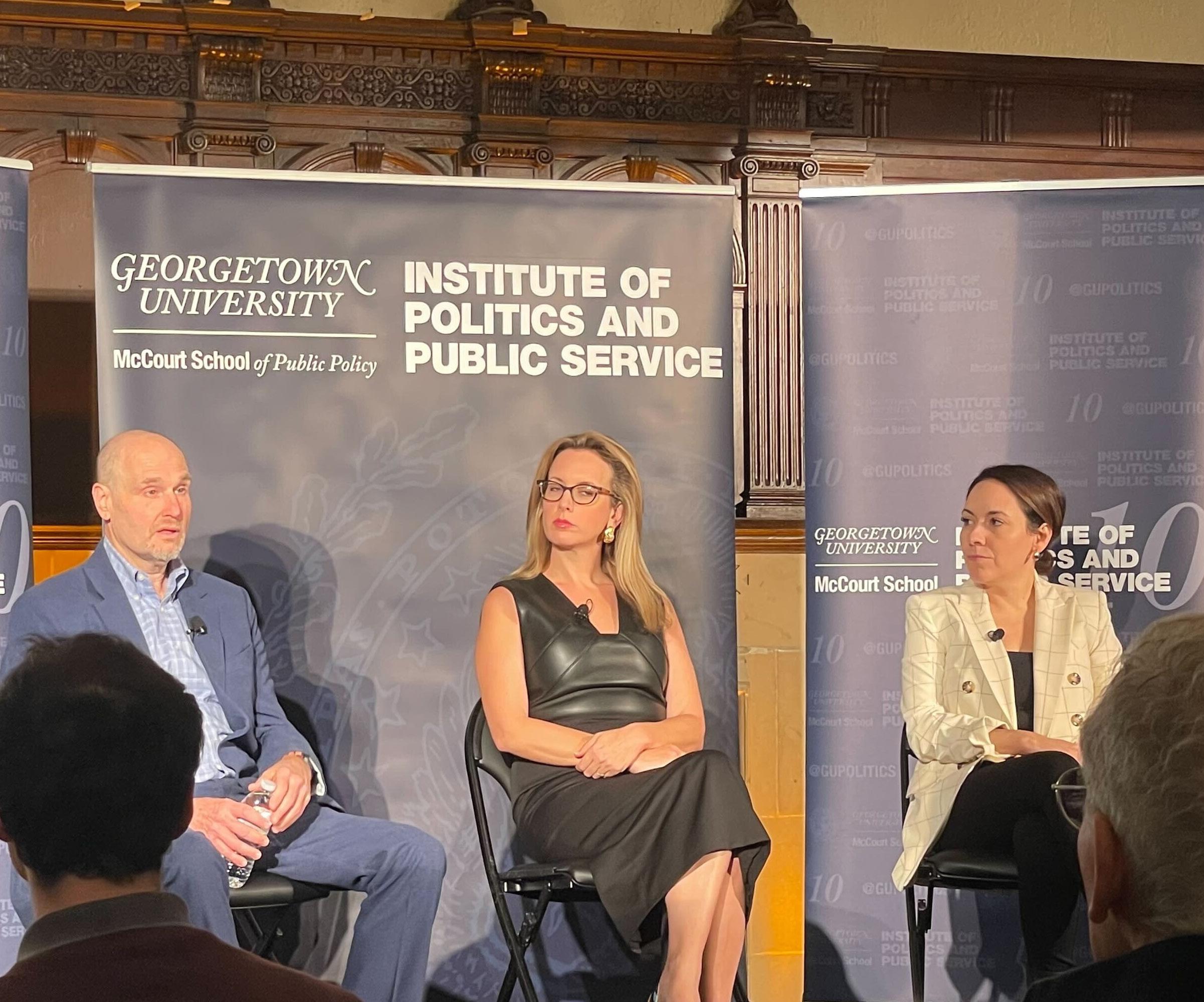
GUSA Certifes Executive, Senate Election Results
Noah De Haan and Sofia Thomas
The Georgetown University Student Association (GUSA) certified the Oct. 22-24 executive and senate election results and elected committee chairs at a senate meeting Oct. 26.
The GUSA Senate unanimously voted to certify Darius Wagner (CAS ’27) as GUSA president-elect and Nazgol Missaghi (CAS ’28) as vice president-elect after they won the executive election by less than 200 votes last week. The senate also unanimously voted to certify the senate elections for both first-year senators-elect and at-large senators-elect.
The senate also appointed Senator Cameran Lane (CAS ’28) as speaker of the senate and Senator Jacob Intrator (CAS ’27) as vice speaker of the senate.
Vonn Russell (CAS ’27), the chair of the Election Commission, said the commission found no issues in the results that would prevent certification.
“Based on everything, the Election Commission does recommend that the Senate does certify these results,” Russell said at the meeting.
Senator Christian Spadini (CAS ʼ26) said the exact results of the first-year senate election were posted on X by an anonymous account
before the GUSA Election Commission announced them Oct. 25.
“I can’t be the only one who saw that comment on Twitter that leaked the freshmen results before they were released,” Spadini said at the meeting. “I checked, and the exact results were posted on Twitter.”
Ella Hastings (CAS ’27), a member of the Election Commission, said the leak shouldn’t prevent the certification of the election results.
“We don’t really know how that got out, but there’s nothing in the bylaws that says it’s an issue of certification,” Hastings said at the meeting. “Voting ended at 8 p.m. on Friday and all results were exported within a ten-minute time period, but results were not impacted by the early release that some people may have seen of the freshman votes, so in my personal opinion, I don’t think it’s an issue for certification.”
The senate unanimously voted to confirm Hastings as director of operations later in the meeting, a position she previously resigned from to assist the Election Commission during the elections period.
Several senators asked the members of the Election Commission present at the meeting about how they handled election results.
Hastings said the Election Commission worked with the Center for Student Engagement (CSE), which supports student organizations, to run the election and that the Qualtrics software, a survey
tool used to collect votes, was secure throughout the election.
“We removed the password from the GUSA drives before the election went on, the password was changed as well, from probably a point of paranoia by the CSE midway through the election as well — there’s been no evidence of tampering,” Hastings said. “The Qualtrics ballot is very complicated. It’s very difficult to work within the first place, very difficult to tamper further from that. The CSE has seen the ballot, they’ve been involved.”
“So minimal to zero ability for interference, nothing looked awry during the election period — the Election Commission received no information that people were messing with the ballot during that period,” Hastings added.
After the senate voted to certify the election results, Wagner swore in the 11 senators-elect.
The senate appointed Zadie Weaver (CAS ʼ28), the previous vice speaker, as the chair of the Policy and Advocacy Committee (PAC), the committee that reviews proposed legislation before it goes before the senate.
The senate also appointed Han Li (CAS ’27) as the chair of the Finance and Appropriations Committee (FinApp), the committee that distributes funds to student organizations. Youngsung Sim (SFS ’27) became the chair of the Ethics and Oversight Committee,
which oversees GUSA’s internal operations and upholds accountability among GUSA members. Weaver, who lost a GUSA vice presidential bid, said as the chair of PAC, she aims to highlight how the senate implements GUSA policies. “One thing I learned from the exec race more than anything is that a lot of what the senate does is doing the problem-solving and doing the solutions, but what there seems to be a lack of is a recognition for the implementation that we do,” Weaver said at the meeting. “I want to make sure that, going forward, the senate gets credit for all the policy work we are doing.” Lane said he plans to work alongside Wagner while ensuring the senate maintains its independence.
“I’m more than capable of working with the soon-to-be President Wagner, but we also have to make sure the senate stays within its own right,” Lane said at the meeting. “I want to make sure that we take our responsibility of oversight seriously.”
Intrator said he hopes to restore unity after a tense election period.
“We had an incredibly tense election cycle, and the number one thing I’m going to do as vice-speaker is to make sure that we unify,” Intrator said at the meeting. “I’m going to work with internal engagement, and with anybody who wants to work with me, to make sure that we pull down the temperatures.”
First-Years Raise Dining, Laundry Concerns at Town Hall
Raegan Hrouda
First-year students voiced concerns about university facilities and dining at the Georgetown University Student Association (GUSA) town hall Oct. 25. Ethan Henshaw (CAS ʼ26), GUSA’s president, and Amelia Snyder (SOH ʼ28), GUSA’s director of outreach, led the meeting, which aimed to introduce GUSA’s role on campus and how GUSA helps students. Around 200 students in attendance expressed concerns about on-campus dining, laundry prices and the cleanliness of first-year dorms.
Snyder said she hoped the town hall would introduce first-years to GUSA and gather student feedback.
“We’re just going to cover what GUSA is, get some feedback from you all, share updates on what we’ve done and what we hope to accomplish in the future, and just how GUSA can be a resource for everyone,” Snyder said at the town hall.
Using anonymous polls, students submitted answers to questions about important issues facing their class.
After a poll that asked students which policy change they most hoped to see, Snyder said dining is a significant issue and recommended students work with and submit feedback to GUSA’s Dining Committee, which collaborates with Hoya Hospitality — the department that oversees on-campus dining.
“I see dining on there a lot,” Snyder said. “Using our dining board is a really great way if you have some specific issues to present or are just really frustrated and want to get involved in speaking with the admin, discussing dining and making a lot of change.”
Henshaw said GUSA is working with the university administration to lower laundry costs.
“We have been working on the laundry,” Henshaw said at the meeting. “I saw that come up there every time. I was talking with one of the vice presidents about working it into financial aid, so hopefully you will see that coming.”
Jayeon Yu (CAS ʼ29), who attended the town hall, said laundry allowance was her biggest concern, but she thinks GUSA heard the concerns about laundry price and will work to make a change.
“I put laundry money as the biggest issue, because I did the math and even doing laundry once a week, you still won’t make it to the end of the year,” Yu told The Hoya. “They did claim that these polls serve as data they can pitch to the administration, so I think they’ll do something with it.”
Henshaw said first-year students should join GUSA to help fix issues facing the student body.
“If you do have issues you seriously care about, you will see progress by joining,” Henshaw said.
The GUSA Senate swore in seven first-year senators Oct. 26 after releasing the Oct. 22-24 election results Oct. 25, and they will now be serving until April 2026.
Yu said the event would have been more useful if it had occurred before the election.
“They’re telling me what the Executive and Senate does, but I’ve already picked these people before I got to know what they’re doing, so it seemed a little useless,” Yu said.
Snyder said the newly established financial accessibility and equity committee, which advocates for students facing economic barriers, began after students expressed concerns about financial inaccessibility on campus.
“The brand-new financial equity committee came into place when a senator realized that it wasn’t just her who was having these issues, but a lot of people were having delayed responses about financial aid,” Snyder said. “This financial committee is working to meet with administrators similar to the dining committee and bring these issues up face-to-face.”
After a poll asking students what their top three priorities are, Snyder said students were most concerned with facilities, transportation and dining.
“I see on there 36% of you voted for facilities, transportation and dining, which seems pretty accurate to what you guys have said already,” Snyder said. Henshaw said GUSA can sway the administration to make a change when enough students provide feedback.
“Obviously we are not an all-powerful organization, it’s not like do this and they’ll do it,” Henshaw said. “But when you have clear student feedback and data backing it, and you also have a good idea that you take to them and present, they do occasionally accept it.”
NOAH DE HAAN/THE HOYA
Journalist Praises Labor Organizations, Condemns Decline in Union Membership
Allister Adair Hoya Staff Writer
A journalist reflected on his experience as a labor activist and stressed the importance of unionization at a Georgetown University Law Center event Oct. 27. Hamilton Nolan, a labor journalist and activist who has written for Gawker, Deadspin and The Guardian discussed his 2024 book, “The Hammer: Power, Inequality, and the Struggle for the Soul of Labor,” and spoke to students and faculty about labor organizing. At the event — which the Georgetown University Law Center Workers’ Rights Institute and Kalmanovitz Initiative for Labor and the Working Poor hosted — Nolan encouraged attendees to view contemporary political issues through a socialist class-based lens and argued that union power offers a strong path toward revitalizing the U.S. working class.
Nolan said unions were instrumental in securing decent wages and benefits for workers in the 20th century.
“In the 1950s, the peak of union power in America, one in three workers in this country was a union member,” Nolan said at the event. “It created, ironically, the golden age of America that Republicans are always talking about going back to.”
“Unions are still the single most important tool to fix the single most important problem in this country,” Nolan added. Nolan said big business and efforts from conservative politicians have contributed to the recent decline in union membership within the United States.
“Today, the portion of workers in unions fell under 10% for the first time in 100 years,” Nolan said. “It’s more accurate to say that union power was assassinated than it declined. It was a product of a sustained assault by corporate America and their political allies.”
Nolan said President Donald Trump’s administration has escalated the existing attacks on unions.
“Before Trump, the air traffic controllers fired by Reagan, 11,000 workers, was considered the worst act of union busting by a president in my lifetime,” Nolan said. “That looks like child’s play compared to what Trump’s already done in his first six months. He’s fired hundreds of thousands of federal workers, tearing up union contracts.”
Since January 2025, over 211,000 federal employees have been terminated or forced out
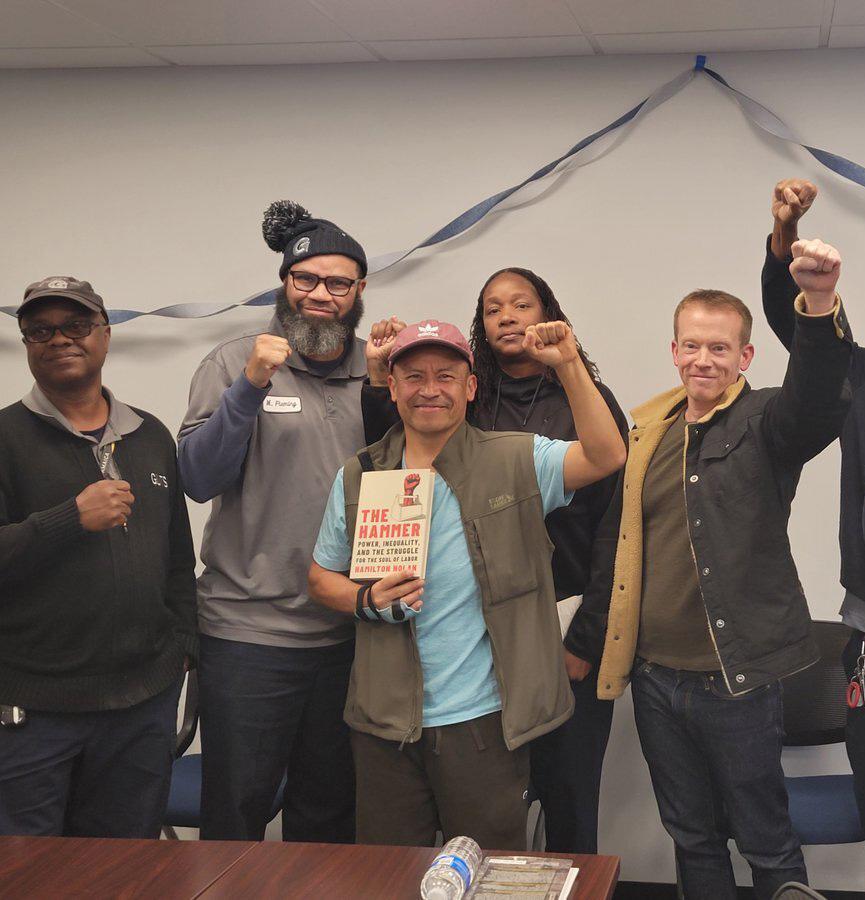
of their federal jobs. Trump also issued an executive order in August to eliminate collective bargaining with several unions representing employees of the federal government.
Nolan’s activist career began while working as a journalist for Gawker, a now-dissolved online blog focused on celebrities and the media industry. He partnered with the Writers Guild of America East, an existing union of print journalists, to help him and his coworkers unionize, which was uncommon for online journalists at the time.
Nolan said the unionization campaign was a swift success, sparking a wave of similar collective action across the online journalism industry.
“We ran a campaign, and in six weeks, we had a union,” Nolan said. “And after we unionized, a big wave went through not just the online media industry but also parts of the traditional media that hadn’t been organized yet.”
In 2024, Nolan published “The Hammer: Power, Inequality, and the Struggle for the Soul of Labor.” The book argues that the United States’ growing wealth inequality stems from the collapse of organized labor and that rebuilding union power is crucial to strengthening democracy.
Nolan also publishes content on a Substack blog titled “How
Things Work,” which has amassed over 40,000 subscribers.
Heather Steffen, an adjunct professor in Georgetown’s Master’s in Engaged and Public Humanities program who joined Nolan on the panel, said the event was meant to help launch a new reading group which plans to cover Nolan and other pro-labor authors.
“I organized Hamilton’s visit today, not only to bring him into conversation with labor figures at Georgetown, but also to inaugurate a new organization on campus, the Georgetown Labor Studies Reading Group,” Steffen said at the event.
Nolan said his book details how unionizing has been the most effective way for workers to improve their conditions and rise into the middle class, highlighting the Las Vegas Culinary Workers Union as an example.
“I have a chapter in my book about the Culinary Union in Vegas, one of the strongest local unions in the U.S.,” Nolan said. “They have the entire casino industry in their union; they are the union that created the middle class in Las Vegas and in Nevada.”
Nolan said social and political victories mean little without economic change, and strengthening the working class through organized labor is the only path forward.
“You cannot win the political war without winning the class war,” Nolan said. “So what do we need to do? Unions need to organize.”

GroupMe Scamming
GU Students Launch Ticket Exchange Startup to Combat
Kayden Ayisi Special to The Hoya
Two Georgetown University students launched an alternate ticket exchange startup Oct. 27 to combat ticket scams.
Ticket scammers frequently join Georgetown students’ GroupMe chats — a mobile platform for sending direct and group messages — posing as students selling tickets at a reasonable price, asking for payment upfront, and disappearing after receiving payment. To combat these scammers, Charlie Wick (MSB ’29) and Mason Tokarz (MSB ’29) launched a replacement ticket platform, TickEx, for Georgetown students to exchange tickets for social events securely.
Tokarz said TickEx will make buying and selling tickets more efficient, allowing all students to participate in social activities.
“Say you wanted to resell a ticket, you would enter this big GroupMe with 4,000 people, but it’s really unorganized and there are scammers,” Tokarz said. “It’s just inefficient, uncomfortable and hard. Our solution is pretty streamlined and efficient.”
TickEx aims to prevent scams by requiring users to log in with their Georgetown email addresses and setting a short time window for each transaction, ensuring only verified students can participate. Wick and Tokarz designed the platform to make ticket exchanges more organized and user-friendly by displaying a categorized layout that al-
lows individuals to browse, list and purchase tickets within minutes.
Sara Tennyson (CAS ’27), who was scammed in a GroupMe chat when trying to purchase Credit Union Cherry Blossom 5K run tickets, said she was blocked after trying to confront the scammer — first by the scammer and then by the platform itself for violating community guidelines.
“They stopped answering me completely and blocked me on GroupMe,” Tennyson told The Hoya. “Then, I was blocked from GroupMe for six months for violating community guidelines by responding to the scammer.”
Tennyson added that the lack of regulation within GroupMe has turned what is advertised as a Georgetown-exclusive space into a risk for students.
“It’s frustrating to me how it is marketed as a Georgetown online community, but there are so many people that do not go to Georgetown in it,” Tennyson said. “It’s a huge safety concern.”
Devyn Johnson (SFS ’29), who has used GroupMe to exchange tickets in the past, said she is optimistic about a new platform for transactions.
“I’m hoping a new platform will eliminate the uncertainty that I’ve experienced with exchanging tickets for social events this year,” Johnson said. Tokarz said that the negative experiences he and Wick, as well as many of their friends, had with the GroupMe ticket exchange inspired
them to create an alternative for students to purchase and sell tickets.
“Both of us had bad experiences on the GroupMe, our friends as well,” Tokarz said. “In my case, it was 10 p.m. and three friends and I wanted to go out. We messaged dozens of people, a few of them actually responded, but most of them were scammers and my friend lost some money.” Wick said they formulated and workshopped their idea with established entrepreneurs through chalk talks and pitch competitions, one of which they placed fourth.
“We’ve gone to chalk talks — we actually met at the Ideathon where we gave birth to this idea,” Wick said. “We also did a pitch competition recently, got fourth place and won $100.”
Tokarz said the pair used Base44, an artificial intelligence (AI)-powered platform that helps users create functional applications without coding, to develop and design the website, integrating their business background with AI tools to enhance the TickEx experience.
“We had the idea, we saw the problem, and now we are just using AI to figure it out,” Tokarz said. Wick said he hopes to eventually see the platform used by students across the country who have experienced a similar issue.
“Nationally, it’s kind of a problem and it’s very unorganized right now,” Wick said. “Our goal is to have this platform used by all the schools that experience the same problems as Georgetown.”

DC Council Rolls Back Tenant Rights Laws for Small Property Owners
Shira Oz City Desk Editor
The Council of the District of Columbia voted 9-4 Oct. 21 to give small rental property owners an exemption from certain tenant laws, removing tenant purchasing rights for two- to four-unit buildings.
The council rolled back the Tenant Opportunity to Purchase Act (TOPA), a 1980 law that requires landlords to notify tenants in writing of their intent to sell the property, offering tenants the opportunity to be the first to purchase and giving them leverage in negotiations. The rollback is part of a larger Washington, D.C. effort to make the property-selling process more efficient for small landlords, from whom many Georgetown University students rent off-campus housing.
Councilmember Matt Frumin (D-Ward 3) said he voted against the amendment because he believed it did not receive enough community input.
“I raised concerns about how the proposed exemption might affect tenants’ rights,” Frumin wrote to The Hoya. “While I understand the intent to encourage investment in smaller rental properties, I believe any significant change to longstanding tenant protections should follow a public hearing process to scrutinize the proposals and come up with something that everyone could feel confident works.”
Noa Pampaloni (CAS ’26), who rents and lives in an off-campus townhouse, said she thinks landlords should not be required to prioritize selling to tenants when deciding to sell.
“If the landlord wants to sell the property, they should be able
to do so without having to sell it to the tenants, especially in my case, where I’m a college student and would not really be able to afford it or know how to deal with it and know that at some point I will leave,” Pampaloni told The Hoya
Councilmember Janeese Lewis George (D-Ward 4) said cutting TOPA will make it more difficult for D.C. residents to succeed in the housing market.
“If we’re serious — truly serious — about closing the racial wealth gap and creating opportunities for Black and Brown residents to stay and thrive in D.C., then we must stop dismantling the very tools that make that possible,” Lewis George wrote to The Hoya. “We should be strengthening TOPA, supporting TOPA, not gutting it.”
While there is no comprehensive data on TOPA, according to the nonprofit D.C. Policy Center, there were 419 transactions subject to TOPA covering roughly 16,962 rental units between 2012-23, roughly 7,409 of which were registered as tenant association (TA) formations, where tenants can organize collectively to exercise their TOPA rights. Half of all sales and TA formations occurred in Ward 7 and Ward 8, neighborhoods that are majority Black and Brown and have the lowest income in D.C. Amy Levin, a D.C. small property owner who rents to Georgetown students, said she is glad the amendment passed because current competition in the housing market is cutting out investors.
“Even a good change still sits on top of a system that is already incredibly hard and expensive to operate in,” Levin told The Hoya. “I’ve personally stopped buying in D.C.,
even though I still help clients do it. In the last year or two, the only people I see still entering the market are buyers planning to live in the building. Actual investors have mostly walked away because it has simply become too burdensome.” Lewis George said he also voted against the bill because it did not offer data on the exemption’s possible impact on tenants.
“This exemption is not minor, it is not technical, and it is absolutely not harmless,” Lewis George wrote. “It takes rights away — not from developers or corporations — but from tenants, families and longtime D.C. residents. And it does so with no clear data on how many properties are even impacted, how many tenants have used their rights or how many buildings are already owned by corporate landlords.” Levin said she is glad the amendment passed because the D.C. housing market can be burdensome and expensive.
“Among landlords, it’s less about ideology and more about exhaustion,” Levin said. “Most are trying to run decent housing in a market where the math barely works.” Levin said she cares about her tenants and properties.
“I never took issue with giving tenants the first opportunity to buy — I think that can be a great outcome when it fits,” Levin said. “The unreasonable part was allowing a tenant who isn’t going to buy to still delay or block a sale just because they live there. And even with everything I just said — I won’t be selling my own buildings until I retire. I love providing housing and I care a lot about the people who live in my units.”
JOHN CURRAN/THE HOYA
A labor journalist and author argued that labor unions are an essential part of democracy in the United States and
‘The Humans’ Is a Heartbreaking Yet Lovable Portrayal of Family
“The Humans,” presented by the Mask & Bauble Dramatic Society premiered Wednesday, Oct. 29 in Poulton Hall and is ready to blow you away with lovable yet realistic characters brought together by great costumes and amazing acting. If you’re looking for an intriguing drama with a touch of horror that’s under two hours with no intermission, look no further!
The play, written by Stephen Karam, is a drama that follows a family during Thanksgiving dinner with spooky undertones that had me shaking in my seat. The dinner is hosted by Brigid Blake (Addison Golden, CAS ’29), whose mother Deirdre (Celeste Viana, CAS ’26), father Erik (Sam Levinger, SFS ’29), grandmother Fiona “Momo” (Lainey Lyle, SFS ’27) and sister Aimee (Julia Toloczko, CAS ’26), are coming to visit her and her boyfriend Richard (Archie Rivero, SFS ’27). Throughout the night, there is consistent banging upstairs and flickering lights, all eerie things that tend to happen in cheap New York City basement apartments. But the main focus of the play is the tension between the characters — the difficulties of caring for an aging parent with dementia and the struggles of trying to stay close to your family when you’re living miles apart. Though “The Humans” is a Halloween production, its message is all-encompassing, something everyone can relate to year-round. The set design works really well within the show. The story is set in a New York City apartment that Brigid and Richard just moved into, perfectly represented by undecorated walls with crackly white paint. It was clearly designed with great attention to detail; for example, the light switch for the apartment’s bathroom actually turns the light on and off. The set also had a lot of purpose within the play, such as the stairs that connected the two floors of the apartment. These were used

multiple times — to show how Bridgid’s aging parents struggle to climb them and to illustrate the inconvenience of having to transport someone in a wheelchair up and down the stairs. The effort put into the set really enhances the effect of the show. Though easy to take for granted, the costuming and makeup for “The Humans” brought the characters completely to life. In particular, the wigs for the father and mother, who both had dark hair with sprinklings of gray, made the characters feel all the more realistic. The same can be said for the clothes of the younger characters, who were dressed not much different from an average Georgetown student. Though it wasn’t very glamorous, the costuming was a huge factor in my enjoyment of “The Humans.” And finally, the acting is incredibly immersive. Though the actors seemed a bit nervous at first, they soon found their groove, and I quickly forgot I was watching a play. Their use of body language was especially powerful,
each performer communicating emotion by showing rather than telling, even when they weren’t the center of the scene. The storyline of caring for an elderly parent, as the father and mother do for the grandmother, was particularly compelling and showcased this technique phenomenally. For example, while the family’s attention is still on the dinner, the mother quietly helps the grandmother sit down, only for the grandmother to push her hand away. Small gestures like these capture the message of “The Humans,” that loving someone is complicated. This meticulous dedication to detail elevated the performance from a simple play to a deeply affecting experience. Overall, I highly recommend this play to anyone looking for something meaningful to do this week. It offers compelling characters and experiences that will resonate with everyone. Mask & Bauble truly brought this story to life, and I fully expect to see a packed audience at the next performance of “The Humans.”
ON YOUR RADAR
By Isabelle Cialone



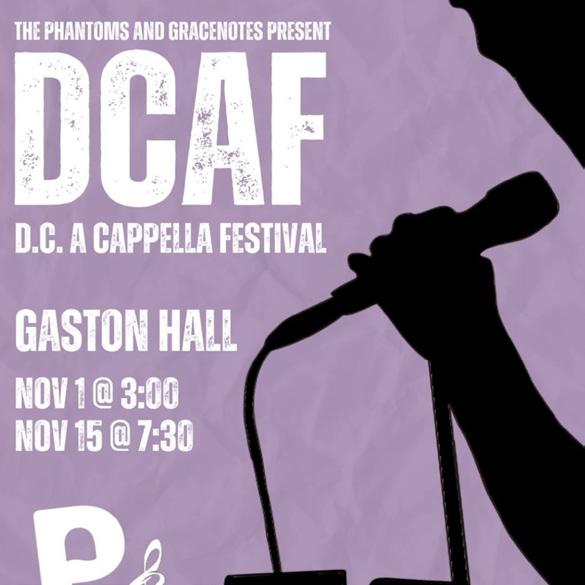
‘Good
Fortune’ Is Class-Critiquing High Comedy in the City of Angels
It’s a comforting thought to imagine that someone from the afterlife is looking after you, ensuring that you don’t meet an untimely and undeserving fate. That thought becomes even more reassuring when the figure looking over your shoulder takes the form of national treasure and all-around teddy bear Keanu Reeves (any Keanu slander will not be tolerated). Aziz Ansari’s “Good Fortune” employs this guardian angel trope in a delightfully fresh and class-conscious exploration of wealth and status in the sundrenched City of Angels.
Reeves stars as a comically inept but kind-hearted and wellintentioned angel Gabriel, looking like a mixture between Jesus Christ himself and trench-coated Columbo. Gabriel is a tiny-winged minor angel (yes, even the angels in this movie have class envy) in charge of saving people from texting-and-drivinginduced crashes.
Bored with his seemingly insignificant role, Gabriel attempts to intervene in the life of Arj (Aziz Ansari), a homeless and down-onhis-luck man who spends his days performing odd jobs and his nights sleeping in his car. After being fired for misuse of funds by his boss and generic rich finance bro Jeff (Seth
Rogen), Gabriel seeks to cheer Arj up by swapping Arj’s and Jeff’s bodies. Things go awry in a “Trading Places” meets “Freaky Friday”-esque situation, with Jeff being forced to confront the struggles that life presents to those less fortunate while Arj enjoys living the high life.
The hilarious dynamic between Reeves, Rogen and Ansari is the backbone of this movie. Any combination of the three is filled with heartfelt moments and actually laugh-out-loud jokes (if the theater hadn’t been near empty when I went with my friends, we would’ve been chased out).
Reeves’ delivery is flat and emotionless, but that becomes part of his charm. No one watches a Reeves movie for some phenomenal Oscar-worthy performance; they watch it because he is so bad that he actually becomes quite good. His descent (arguably an ascent) from a middle-level angel to a chainsmoking, salsa-dancing line cook is a performance you didn’t even know you needed until you see it, at which point you wonder what life was like before this movie.
Rogen delivers, as he always does, with his signature laugh and loveably douchey demeanor, but Ansari’s performance leaves something to be desired. His dialogue maintains the same whine throughout, and while he makes you feel for his character’s situation (you lack basic empathy if you don’t), it feels like
he’s trying to perform a standup routine rather than create a compelling character.
Despite the occasionally questionable delivery, every line in this movie is a well-earned and well-written laugh. The jokes feel fresh and original, and they make up a continuous stream of genuinely humorous remarks that are somehow even funnier when they come from Reeves himself. Keke Palmer gives a good performance as Elena, Arj’s love interest and aspiring union organizer for the hardware store where they both work. Her role is unfortunately relegated mainly to that of Arj’s love interest, which undercuts her potential to make the movie even better (go watch “One of Them Days” starring Palmer and SZA, you’ll thank me later). “Good Fortune” delivers a clear, though sometimes heavyhanded, message about class consciousness with a moral that even a kindergartener couldn’t miss. It’s a well-timed reflection on the unrelenting and hellish struggle to make ends meet and the utter disregard and ignorance of these struggles by those who control the majority of the wealth. Despite the pervasive and often glaringly obvious way in which this message is conveyed, “Good Fortune” delivers a delightful mixture of social commentary and deadpan comedy to make it well worth an hour and a half of your day.

Reeves is a literal angel in the hysterical,
‘Nuremberg’
Examines Monster’s Mind
“Nuremberg,” written and directed by James Vanderbilt, is a political throwback that tries for prestige but ends up with just a bit too much polish for its own good. A dialogue-driven drama, “Nuremberg” — which adapts Jack El-Hai’s 1945 novel “The Nazi and the Psychiatrist” — explores the moral aftermath of World War II through the lens of the layered dynamic between psychiatrist Douglas Kelley (Rami Malek) and Nazi leader Hermann Göring (Russel Crowe). For most of its 148-minute runtime, the audience follows our two leads, who are locked in a prison cell where Kelley is assigned to keep Göring alive long enough to face his trial at Nuremberg. The discussion in the cell becomes almost a cage match in which we see a slow, deliberate battle of wits, with a mixture of stately dialogue and a charismatic performance from Crowe. Although the basis here promises moral complexity, with a glance at how these two figures’ intellect is rivaled only by their narcissism, Vanderbilt delivers a film that feels more handsomely watchable than anything: entertaining, wellacted, but maybe a little too clean around the edges.
The film mixes scenes both inside and outside of Göring’s cell with deliberate, but perhaps slightly slow, pacing. Vanderbilt — alongside cinematographer Dariusz Wolski, known for his work on the “Pirates of the Caribbean” franchise — paints the world in browns and grays
with dim institutional lighting. Although this combination might sound like the makings of a boring film, the presentation here is professional and confident, clearly an effort to bring gravitas to modernize a bygone film archetype, just with the color grading of an HBO limited series. Crowe’s and Malek’s performances make up the core of the film, with their line deliveries being arguably more important than the script itself. As Göring and Kelley spar verbally, Crowe manages a convincing accent, alternating from English to German, which he learned for the role. Furthermore, Crowe strikes a perfect balance between charismatic and commanding, giving one of his better performances as of late, and somehow manages to feel uncomfortably human, a chilling feat given all of Göring’s evil deeds. Given the morally complicated subject, the dedication to learning an accent and a new language, and promotional quotes like “a powerhouse return to Oscar form for Russell Crowe,” the campaign for Crowe’s fourth Oscar nomination seems inevitable. In the context of the film, though, Crowe’s Göring reminds us of the unnerving reality that such historical villains had personal lives, with sections that touch on Göring’s family and Kelley’s developing relationship with Göring’s daughter.
Beyond this relationship, Kelley feels stranded between two worlds and, while undoubtedly intelligent, his character lacks depth. The script has a half-baked portion hinting that Kelley, whose fascination with the prisoners might stem more from ego than from empathy, may share in Goring’s narcissism, but these ideas remain sketches rather than fully formed
arguments. Also, Kelley is repeatedly shown to be a hobbyist magician, often performing tricks for Göring, with his magician’s sleight of hand mirroring his deftly deceptive use of language. However, Malek isn’t given any of the ambiguities that Crowe explores so well in his role as Göring. The film’s courtroom climax demonstrates Vanderbilt’s most daring choice: Evidence during Göring’s trial includes real footage from concentration camps. This scene is devoid of any score, and seeing the expressions of the cast shift as they uncomfortably try to reconcile what they know about Göring with the horrors they are seeing on screen is when “Nuremberg” actually reached meaningful resonance for me. This scene feels raw and heartbreaking, and I was left wondering why the rest of the film feels so much more overwritten compared to this one, authentic instance. Tonally, Vanderbilt aims high with dense but accessible dialogue, quick exchanges and a certain measured elegance in how the film moves. But this same calculated precision sometimes works against “Nuremberg.” The more the film tries to convince me of its weight and deeper messages, the more I can’t help but notice the overproduction. This makes it feel like Oscar bait by design, but, in actuality, it’s a bit too conventional. In the end, Crowe’s performance alone should be enough to fill theaters, and Vanderbilt’s steady direction is visible throughout the runtime. However, the film’s attempt to blend scenes full of tension with emotional stakes never truly connects, making “Nuremberg” a film that is easy to appreciate and even easier to finish.
IMDB
Keanu
comical “Good Fortune,” says Mauro
Brad Derfner Guide Columnist
Mauro Mazzariello
Riya Sundaram Guide Columnist
Screenwriting, Acting Shine Bright In
Richard Linklater’s ‘Blue Moon’

BLUE MOON, from A12
acter, the film’s ending is quietly devastating, as Hart ends up alone at the bar, the screen fading to black on his lonely form. The credits mention that Rodgers and Hammerstein would go on to have one of the most successful creative partnerships in musical history following Hart’s death from pneumonia several months after the opening of “Oklahoma!” Throughout the film, we see Hart wracked with a doomed hopefulness. Hart falls in love with everything and everyone, not because he wants to, but because he is drawn to beauty, which is why he fawns over and idolizes the beautiful Elizabeth Weiland (Margaret Qualley). To him, she is the epitome of life’s beauty and everything it has to offer. Hart describes himself as “omnisexual,” drawn to anything that he finds beautiful in his life, be it a person, a book or a work of art. Hawke’s raw portrayal of a flawed man desperately clinging to anything that could give him
the hope of being loved and considered for another day strikes a deep chord. The film neither romanticizes nor idealizes Hart’s struggles, providing a realistic character study that garners sympathy. His endless monologues make for a complex and challenging role, which Hawke executes to perfection, marking his performance of a lifetime. I found myself intensely drawn to Hart’s imperfections and his touching story.
However, Hawke’s performance was not the only outstanding one. Scott’s portrayal of Rodgers conveyed a sense of concerned pity, highlighting both Rodgers’ evident respect for Hart and his unwillingness to jeopardize his own future because of Hart’s uncertainty. Both Hawke’s and Scott’s performances aptly conveyed the complexity of the duo and the raw emotion felt in the wake of the opening-night events. Rodgers and Hart’s relationship is complicated, and their interaction is minimal, but it is still explored in great depth.
While the acting stood out the most, “Blue Moon” would not have achieved its timeless quality without its well-executed pacing and lovely cinematography. While the entire film is shaped around dialogue, providing little plot action as one would usually expect from a Linklater film, it allowed us to focus on Hart’s emotional development. This felt like a natural way to pace a film that would best be categorized as a character study. Hart’s philosophical ramblings really took root in the smoke-filled ambience of Sardi’s. The cinematography highlighted the bar’s warmth, magnifying and reflecting Hart’s longing for human connection. Overall, the film is tinged with melancholy and nostalgia, yet it showcases the beauty and fragility of Hart’s idealistic soul, lost amid the harsh realities of the world. Anyone hoping for a touching story exploring the complexities of a troubled artist should look no further than Linklater’s excellent “Blue Moon.”

share their experience filming romance “Regretting
Quadeca Reveals His Artistic Process
QUADECA, from A12
Lasky’s love and commitment to music is evident in the way he curates his albums. “Vanisher” has multiple vinyl variants for sale, each one with exclusive cut tracks on their D-sides.
Lasky said adding these tracks adds to the album’s lore and intrigue.
“I like having unreleased music on physical releases,” Lasky said. “It makes the vinyl feel like even more of a relic.”
When listening to his albums, Lasky said he determines if any song feels out of place within the album’s story. Each song has to be purposeful, and the only way to tell if that’s the case is to listen to the album all the way through.
Listening to an amazing album in its entirety is an amazing feeling. The wave that washes over the listener once it’s over is a unique feeling, one that Lasky said he understands well.
“Every song needs to be its own thing. I try not to do full album listens until they’re all the way
done,” Lasky said. “I think doing full listens can give you a cop out because when you listen to everything it’s like, ‘wow!’”
Lasky said that by focusing on the completion of the individual songs, each track becomes its own experience.
“Once it’s there, you can indulge yourself with the full listen, you know?” Lasky emphasized.
“Vanisher” isn’t just an album — it’s a concept. Visual storytelling plays a large role in this piece, and a big part of that came from Quadeca’s collaboration with Oregonbased photographer Brendon Burton. Lasky’s creative team got to explore a vast array of locations in the creation of “Vanisher’s” photo book and movie, shooting in locations like Greece, Oregon and the Philippines. When talking about a photo he took on a tall, treacherous rock, Lasky noted that the photo exemplifies the creative connection between him and Burton, known for his
haunting photography and use of abandoned spaces.
“We have a similar perspective when it comes to locationbased art,” Lasky said. “He understands, you know, it’s all or nothing with this art.” Lasky doesn’t see music videos solely as promo; to him, they are an art form in their own right. He previewed a full-length music video detailing the
“Vanisher’s” nautical concept that runs over an hour long and that accompanied the album’s release in select theaters.
“It’s a way to explore the album,” Lasky said. “The visuals of an album helps it click with people.” Lasky encouraged those who are creatively driven to pursue their passion for art as a way to reconnect with oneself within the craziness of today’s world.
“To any of the Georgetown students that like art and want to be creative, they should do it,” Lasky said. “The world is unpredictable and messed up, so chase that little thing that frees your heart.”

‘Bugonia’ Is a Wonderfully Shocking Condemnation of Modern Humanity
BUGONIA, from A12 their actions and acknowledges the reality of the fundamental issues they each argue.
“Bugonia” relies heavily on the characters’ heated exchanges, anchored by incredible performances all around. In what is now her fourth feature film working with Lanthimos, Stone delivers a captivating performance as the commanding and unwaveringly resolute Fuller. The tension between her and Teddy is searing, with Stone’s brilliance matched by Plemons’ embodiment of Teddy’s complex unpredictability and occasional chilling human sympathy. Delbis offers a fantastic supporting performance, and the almost brotherly love between Teddy and Don is tragically bittersweet.
Teddy’s childhood babysitter, Casey (Stavros Halkias), whose presence is somewhat inexplicable but wholly welcome as it both defuses the tension and amps it up in different moments.
Halkias satisfyingly portrays Casey, infusing his character with surprising complexity despite his minimal screentime.
Though the film ultimately opts not to ground itself fully in reality, which I foresee as being potentially
polarizing for audiences, I found it to be an aptly striking resolution to the central intrigue. “Bugonia,” through its absurd plot and chilling characters, scathingly condemns humanity for blindly adopting misinformed, conspiratorial worldviews, as well as for the oppressive economic systems and the ecological destruction that these systems cause. It is a necessary cinematic intervention that couldn’t have been released at a more appropriate moment in time.
REGRETTING YOU, from A12 with that and get to lean into the melodrama of it all and get to not worry about those things.”
Thames said the film’s romantic elements were particularly important in scenes that leaned less heavily on dialogue.
“My favorite one is the promposal when we’re not saying anything and you’re watching the video, and my back is faced towards the screen,” Thames said. “I’m just looking at Clara, and I think a lot is said between a couple of those looks.”
Grace said the drama of various scenes — such as one in which Miller holds Clara after she cries — was equally im-
portant to developing the film’s emotional gravitas.
“There’s also a scene that’s very intense and dramatic,” Grace said. “We’re just laying there and I feel like that’s such an intimate feeling.”
But “Regretting You” is not only romantic — it is also a story about healing from grief. As Clara gets to know Miller, their love for one another becomes a strong support system in the face of hardship.
“I think that they’re both very strong characters on their own, but I think what’s beautiful about them coming together is it’s not like they’re really taking or adding parts to each other,”
Grace said. “It’s just they’re kind of there for each other.”
“The most important thing about Miller and Clara is they were both broken people,” Thames added. “No matter what one person has going on, they’re there for each other and they understand and they listen.”
Grace and Thames both said they expect to, in the future, look back on the process and see how much they’ve grown since.
“Just the past two years have been really crazy in my life,” Thames said. “I think a lot has changed. Clara and her mother and how their relationship was and how this tragedy brought them closer, I think — as you grow up — it’ll distance you from people and bring you closer to some.”
The film’s score is equally grandiose and just as strange as its premise, and its soundtrack features a perfect use of Chappell Roan’s “Good Luck, Babe!” The characters’ interactions and musical accompaniment are tension-inducing, as are the claustrophobic close-ups that each character seems to live in, isolated from their surroundings. The stark, corporate color palette of grays, whites and reds, offset by the somewhat dingy but familiar feel of the cousins’ backroad mid-American home is all beautifully captured in VistaVision. Despite the palpable tension and satiric exaggeration that pervades much of the film, “Bugonia” also abounds with humor. Much of this comes from

Richard Linklater returns to the big screen with “Blue Moon,” a heartbreaking and
CAMERON LAU /THE HOYA
FILM
IMDB
Mckenna Grace and Mason Thames
IMDB
Yorgos Lanthimos makes a comeback with “Bugonia,” a scathing

‘Blue Moon’ Is A Masterclass In Character Study Films
Eliana Kut
“Blue Moon,” directed by Richard Linklater, is an emotionally rich tribute to the life and works of Broadway songwriter Lorenz Hart (Ethan Hawke). It focuses on the night of the release of “Oklahoma!” the first musical that Hart’s creative partner, Richard Rodgers (Andrew Scott), produced without him. In true Linklater fashion, the film’s plot and pacing revolve purely around dialogue, allowing Hawke to delve into a poignant character study of Hart.
“Blue Moon” opens with Hart’s last moments alive as he stumbles drunkenly down an alleyway before collapsing. The film then shifts to several months earlier, when Hart — a middle-aged hopeless romantic who is deeply sensitive to rejection — angrily leaves the opening night of “Oklahoma!” and instead heads to a bar. Through his conversation with Eddie (Bobby Cannavale), the barman, it is revealed that he copes with the struggles of his demanding life as a lyricist by drinking heavily. His alcoholism and subsequent depression have made him inconsistent as a lyricist for Rodgers’ musicals, which pushed Rodgers to produce his “Oklahoma!” with lyricist Oscar Hammerstein II (Simon Delaney). As Eddie tries unsuccessfully to stop Hart from drinking throughout the night, Rodgers, Hammerstein II and other members of the production and audience start filing into the bar. A very dialogue-heavy film, Hart’s on-and-off conversations with budding author E.B. White (Patrick Kennedy) throughout the night highlight his obsession with beauty and romance as well as writer Robert Kaplow’s strong screenplay. With this development in Hart’s char-
See BLUE MOON, A11

‘It’s
All or Nothing With This Art’ in Talk With Quadeca
Juan P. Almanza
Ben Lasky, better known by his stage name, Quadeca, is a force of nature. His 2025 album “Vanisher, Horizon Scraper” pushed boundaries with its wide array of sounds, ranging from experimental hip-hop to Brazilian samba, all framed around a nautical narrative. After his Oct. 22 show at the 9:30 Club, I interviewed him about his music, new label and art form.
Lasky introduced himself humbly as simply a musician and talked about Washington, D.C., being his most anticipated and biggest show. After selling out at The Atlantis, he was upgraded to the 9:30 Club, which can seat 1,200. When asked what five words he’d use to describe “Vanisher,” he answered, “fantasy, whimsical, ascension, worldly and groovy.” “Vanisher” is lush with layers and otherworldly harmonics, and Lasky said “Godstained,”
the album’s first single, was the hardest to produce because each instrument plays a unique role on the track.
“Listening through the whole song for the flute is its own listen and if you listen all the way just for the guitar, that’s its own listen,” Lasky told The Hoya “Godstained” is truly a beautiful display of music — it sounds as though each instrument has a mind of its own, all coming together in an enchanting collective.
‘Regretting You’ Stars Refect on Romance
Grace Ko
“Regretting You,” based on Colleen Hoover’s 2019 novel of the same name, is the latest Hoover adaptation to hit theaters. Directed by Josh Boone, “Regretting You” focuses on the fallout between Clara Grant (Mckenna Grace) and her mother, Morgan Grant (Allison Williams), after the sudden passing of Clara’s father, Chris (Scott Eastwood), and her aunt, Jenny (Willa Fitzgerald), in a car accident. As Clara and Morgan navigate their grief, Clara explores her newfound romance with Miller (Mason Thames) while Morgan attempts to move past her anger alongside her brother-in-law Jonah (Dave Franco).
Prior to the film’s release, The Hoya was able to attend an Oct. 19 college roundtable with stars Grace and Thames, who shed more light on their characters, their love of romance films and their experiences filming.
Thames and Grace said they were both drawn to the project for the chance to work together — particularly on a romance film — despite neither being familiar with the original source material. “I got the script and I talked to Josh Boone, our director, and I mean, I just fell in love with the story,” Thames said at the roundtable. “And I knew Mckenna was signed on, so it was kind of a no-brainer.”

“I was really stoked to do Miller and Clara because I’ve never done a romance,” Grace said.
“Regretting You” depends, in part, on the chemistry between Grace and Thames as the film’s primary romance. Despite the whirlwind of emotions that often emerges for actors working on romance movies, the pair felt at ease with each other throughout the process.
“It was pretty easy,” Grace said. “With anybody else, I think it would’ve been a lot scarier, so I’m very lucky and grateful that I got to have my first real onscreen romance with somebody that I love and trust so much.” Thames said Boone, who directed “The Fault in Our Stars,” is no stranger to the romance genre and helped guide the pair throughout filming the romantic drama.
“We all just trusted Josh and we all did our best to serve his vision and serve these characters,” Thames said. “What I love so much about Josh is he sets us down this path, and then we get to play with things a little bit.”
“We’re actors, so it’s fun — we love being dramatic,” Grace said. “Working with Josh made me feel very safe to play around
Quadeca’s openness and love for unique sounds and boundarypushing art extends beyond himself, and Lasky said this was one of the reasons he founded his new label, X8 Music. Lasky said he sees the label as a form of self-expression, whether that be for creative rollouts or a platform for budding artists with unique musical styles he believes deserve a chance in the spotlight. Olēka, flute player for the “Vanisher” tour and a musician of X8 Music
exemplifies this mission; her latest single, “Sunshine When It Rains / See The World,” is a beautiful chamber pop piece with angelic vocals. Lasky said he sees his position as a unique one, especially given his enthusiastic fan base.
“They’re so receptive to so many different styles because I incorporate so many different styles into my music,” Lasky said. “They will listen with open ears.”
Following a recent torrent of films examining how humanity has doomed and damned itself — think “Eddington,” “Superman” and “One Battle After Another” — comes Yorgos Lanthimos’ “Bugonia.” A welcome addition to this lineup, “Bugonia” distinguishes itself from the others by tackling the topic through dialogue-driven intrigue.
A remake of the 2003 South Korean film “Save the Green Planet!,” “Bugonia” centers on cousins Teddy (Jesse Plemons) and Don (Aidan Delbis) who live in a solitary echo chamber of Teddy’s conspiratorial beliefs that Earth is secretly ruled over by Andromedans, an alien species that is biologically corrupting humanity. Teddy’s research has convinced him that Michelle Fuller (Emma Stone), CEO of the monolithic pharmaceutical company for which Teddy works, is one such alien being. So, naturally, the cousins abduct her and take every precautionary measure to protect themselves from the creature’s devious wiles — they chemically castrate themselves, shave her head and slather her with antihistamine cream. Thus commences
an increasingly tense series of discussions and negotiations. In classic Lanthimos style, the plot is infinitely more unhinged than can be adequately described, but the film’s utter absurdity, overarching ambiguity and final twist ultimately make it a resonant, thought-provoking piece. Though the cousins’ introductory dialogue and intimidating low-angle shots of Fuller prime the audience to initially side with Teddy and Don, the film’s increasing madness leaves you wondering whose side you should really be on. The film neither lauds nor ridicules Teddy, who represents a satirized caricature of the many U.S. citizens that are subject to internet-induced mass psychosis and who fall prey to uninformed and even fantastical conspiracies. Similarly, Fuller, while clearly the victim of the situation, is still portrayed as a cold, almost inhuman millionaire, who has built her wealth by stepping on the backs of poor and working-class people like Teddy and Don. The final twist and poignantly beautiful last sequence make it abundantly clear that the film’s apparent neutrality is actually meant to highlight the validity of both sides’ claims — it is a commentary on humanity that simultaneously condemns these individuals for
CAMERON LAU/THE HOYA
Isabelle Cialone
